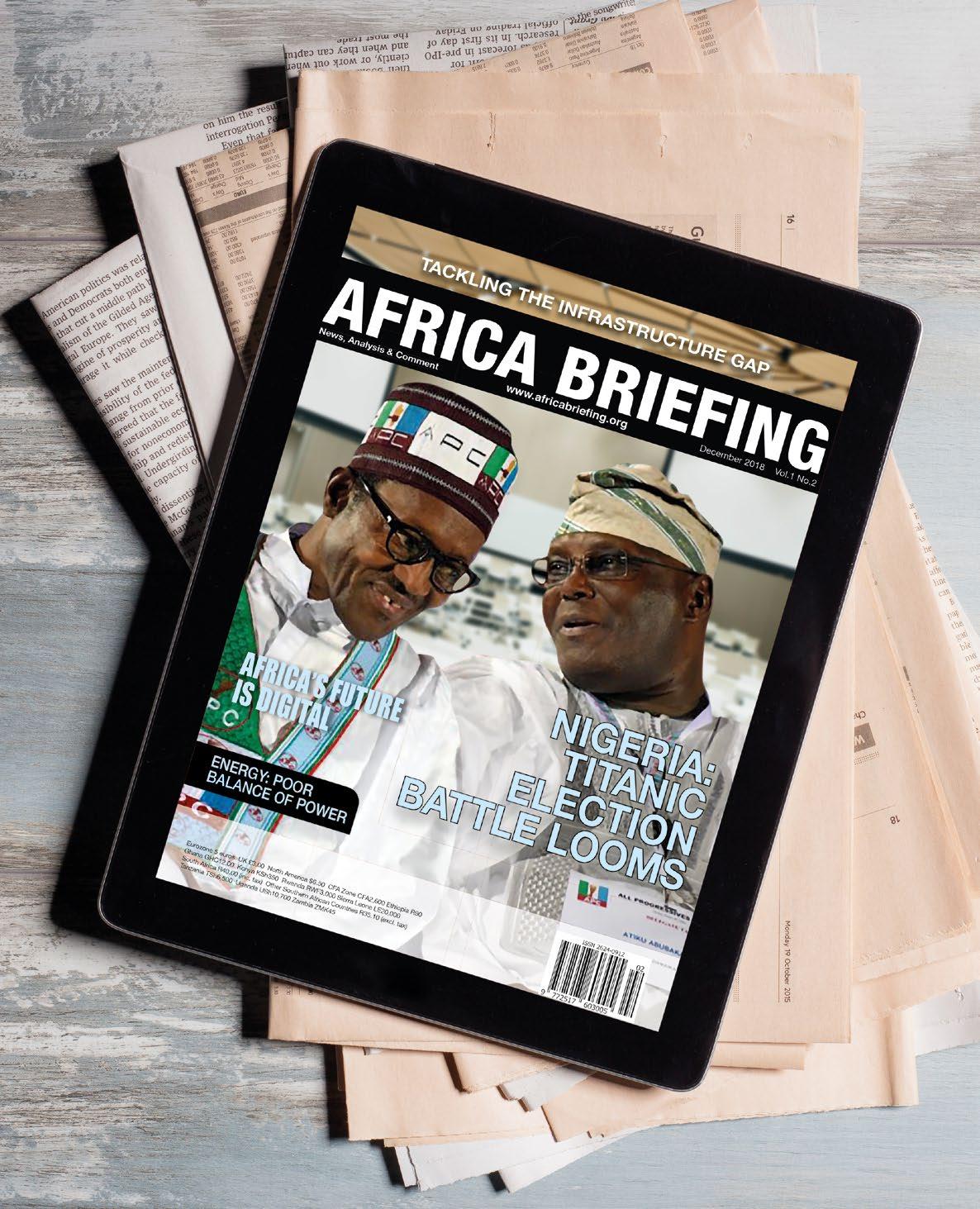












IN recent years, African nations have increasingly recognised the importance of adding value to their mineral exports to drive economic growth and sustainability. Ghana is spearheading this movement, leveraging its rich mineral resources to emerge as a hub for battery production.
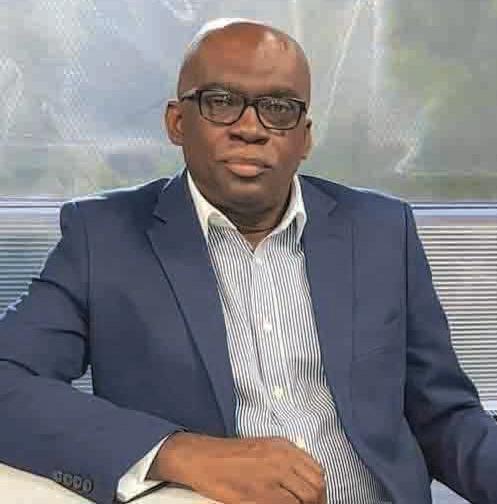
Ghana, with its extensive history of mining and exporting gold, is diversifying its economy by tapping into other mineral resources like lithium, manganese, bauxite, and diamonds. The government has granted licences for lithium mining in Ewoyaa and plans to build a lithiumrefining facility in Tema, Ghana's largest port. These endeavours are strategically positioned to meet the rising global demand for lithium-ion batteries, driven by the growth of electric vehicles and renewable energy technologies. Ghana aims to capitalise on its abundant lithium reserves to become a key player in the battery supply chain, fostering industrialisation, job creation, and technological advancement.
Beyond lithium, Ghana is exploring opportunities in other minerals like manganese, bauxite, and iron ore. Joint venture projects are underway to develop refining facilities for manganese and bauxite, while efforts are being made to assess iron ore deposits for an integrated iron and steel industry.
These initiatives reflect a broader trend across Africa, with countries like Namibia, Zimbabwe, and Tanzania implementing bans on raw mineral exports to promote domestic refining capacity and value-added processing.
Jon Offei-Ansah Publisher
Desmond Davies Editor
In 2018, six of the 10 fastest-growing economies in the world were in Africa, according to the World Bank, with Ghana leading the pack. With GDP growth for the continent projected to accelerate to four per cent in 2019 and 4.1 per cent in 2020, Africa’s economic growth story continues apace. Meanwhile, the World Bank’s 2019 Doing Business Index reveals that five of the 10 most-improved countries are in Africa, and one-third of all reforms recorded globally were in sub-Saharan Africa.
Publisher
Jon Offei-Ansah
Editor
Desmond Davies
Contributing Editors
Prof. Toyin Falola
Tikum Mbah Azonga
Prof. Ojo Emmanuel Ademola (Technology)
Valerie Msoka (Special Projects)
Contributors
Justice Lee Adoboe
Chief Chuks Iloegbunam
Joseph Kayira
Zachary Ochieng
Olu Ojewale
Oladipo Okubanjo
Corinne Soar
Kennedy Olilo
Gorata Chepete
Designer
Simon Blemadzie
Angela Cobbinah Deputy Editor
Contributing Editor
Stephen Williams
The shift towards value addition is driven by various factors. Firstly, there's a need to diversify African economies away from overreliance on raw material exports. By adding value to mineral exports, countries can increase revenue, create jobs, and foster industrialisation. Secondly, there's a global trend towards securing critical mineral supply chains and reducing dependence on dominant players like China. Africa's significant reserves of critical minerals present an opportunity for the continent to emerge as a key player in the global market.
Michael Orji
Country Representatives
South Africa
Edward Walter Byerley
Top Dog Media, 5 Ascot Knights
What makes the story more impressive and heartening is that the growth – projected to be broad-based – is being achieved in a challenging global environment, bucking the trend.
In the Cover Story of this edition, Dr. Hippolyte Fofack, Chief Economist at the African Export-Import Bank (Afreximbank), analyses the factors underpinning this performance. Two factors, in my opinion, stand out in Dr. Hippolyte’s analysis: trade between Africa and China and the intra-African cross-border investment and infrastructure development.
Much has been said and written about China’s ever-deepening economic foray into Africa, especially by Western analysts and commentators who have been sounding alarm bells about re-colonisation of Africa, this time by the Chinese. But empirical evidence paints a different picture.
Despite the decelerating global growth environment, trade between Africa and China increased by 14.5 per cent in the first three quarters of 2018, surpassing the growth rate of world trade (11.6 per cent), reflecting the deepening economic dependency between the two major trading partners.
Empirical evidence shows that China’s domestic investment has become highly linked with economic expansion in Africa. A one percentage point increase in China’s domestic investment growth is associated with an average of 0.6 percentage point increase in overall African exports. And, the expected economic development and trade impact of expanding Chinese investment on resource-rich African countries, especially oil-exporting countries, is even more important.
Justice Lee Adoboe
Chuks Iloegbunam
Joseph Kayira
Zachary Ochieng
Olu Ojewale
Oladipo Okubanjo
Corinne Soar Contributors
Despite the potential, African countries face challenges like inadequate infrastructure, limited technological capabilities, regulatory uncertainties, and geopolitical risks. However, with the right policies, investments, and partnerships, these challenges can be overcome. Developing processing infrastructure requires significant investments in energy, water, and transportation infrastructure, along with addressing the absence of specialised skills and technological expertise.
47 Grand National Boulevard Royal Ascot, Milnerton 7441, South Africa
Tel: +27 (0) 21 555 0096
Cell: +27 (0) 81 331 4887
Email: ed@topdog-media.net
Ghana
Nana Asiama Bekoe
Gloria Ansah Designer
Country Representatives
South Africa
Moreover, creating an enabling regulatory environment is crucial to attract investments and foster sustainable development. Political instability, civil unrest, and regulatory changes can disrupt operations and undermine investor confidence. Hence, ensuring political stability, strengthening governance institutions, and promoting regional cooperation are essential to mitigate risks and create a conducive investment environment.
Edward Walter Byerley
Top Dog Media, 5 Ascot Knights
African countries' efforts to add value to their mineral exports have far-reaching implications for economic development, industrialisation, and sustainable growth. By fostering downstream industries, countries can create jobs, generate revenue, and stimulate economic diversification. Value addition also promotes technological innovation, skills development, and knowledge transfer, driving long-term competitiveness and resilience.
47 Grand National Boulevard Royal Ascot, Milnerton 7441, South Africa
Tel: +27 (0) 21 555 0096
Kingdom Concept Co.
Tel: +233 243 393 943 / +233 303 967 470 kingsconceptsltd@gmail.com
Nigeria
Nnenna Ogbu
#4 Babatunde Oduse crescent
The resilience of African economies can also be attributed to growing intra-African cross-border investment and infrastructure development. A combination of the two factors is accelerating the process of structural transformation in a continent where industrial output and services account for a growing share of GDP. African corporations and industrialists which are expanding their industrial footprint across Africa and globally are leading the diversification from agriculture into higher value goods in manufacturing and service sectors. These industrial champions are carrying out transcontinental operations, with investment holdings around the globe, with a strong presence in Europe and Pacific Asia, together account for more than 75 per cent of their combined activities outside Africa.
Cell: +27 (0) 81 331 4887 Email: ed@topdog-media.net
Ghana
Nana Asiama Bekoe
Furthermore, value addition contributes to sustainable development by promoting local beneficiation, resource stewardship, and environmental sustainability. By processing minerals domestically, countries can ensure that benefits accrue to local communities and encourage responsible mining practices.
A survey of 30 leading emerging African corporations with global footprints and combined revenue of more than $118 billion shows that they are active in several industries, including manufacturing (e.g., Dangote Industries), basic materials, telecommunications (e.g., Econet, Safaricom), finance (e.g., Ecobank) and oil and gas. In addition to mitigating risks highly correlated with African economies, these emerging African global corporations are accelerating the diversification of sources of growth and reducing the exposure of countries to adverse commodity terms of trade.
Kingdom Concept Co.
Tel: +233 243 393 943 / +233 303 967 470 kingsconceptsltd@gmail.com
Nigeria
Taiwo Adedoyin
Isheri Olowora - Isheri Berger, Lagos
Tel: +234 803 670 4879 getnnenna.ogbu@gmail.com
Kenya
Patrick Mwangi
Aquarius Media Ltd, PO Box 10668-11000
This makes me very bullish about Africa!

MV Noble, Press House, 3rd Floor 27 Acme Road, Ogba, Ikeja, Lagos
Kenya
African countries' endeavours to add value to their mineral exports signify a shift towards economic diversification, industrialisation, and sustainable development. Ghana's initiatives in lithium mining and processing serve as a testament to the continent's potential to unlock economic value through strategic investments and partnerships. By overcoming challenges and embracing sustainable practices, African countries can harness the full potential of their mineral wealth and pave the way for inclusive and resilient growth.
Tel: +234 806 291 7100 taiadedoyin52@gmail.com
Naima Farah
Room 22, 2nd Floor West Wing Royal Square, Ngong Road, Nairobi
Tel: +254 729 381 561 naimafarah_m@yahoo.com
Africa Briefing Ltd
2 Redruth Close, London N22 8RN
United Kingdom
Tel: +44 (0) 208 888 6693 publisher@africabriefing.org
Nairobi, Kenya
Tel: 0720 391 546/0773 35 41
Email: mwangi@aquariusmedia.co.ke
©Africa Briefing Ltd
2 Redruth Close, London N22 8RN
United Kingdom
Tel: +44 (0) 208 888 6693 publisher@africabriefing.org
6
Sudan becoming another Somalia
07
Is Africa ready for the fast-changing world order?
08
Historic elections in South Sudan
For the first time in its 13 years of independence, the country is poised to hold a groundbreaking general election in December. Maggie LoWilla looks at power, politics and the pathway to what will be one of 19 elections in Africa this year
10
South Sudan still trying to pick up the pieces
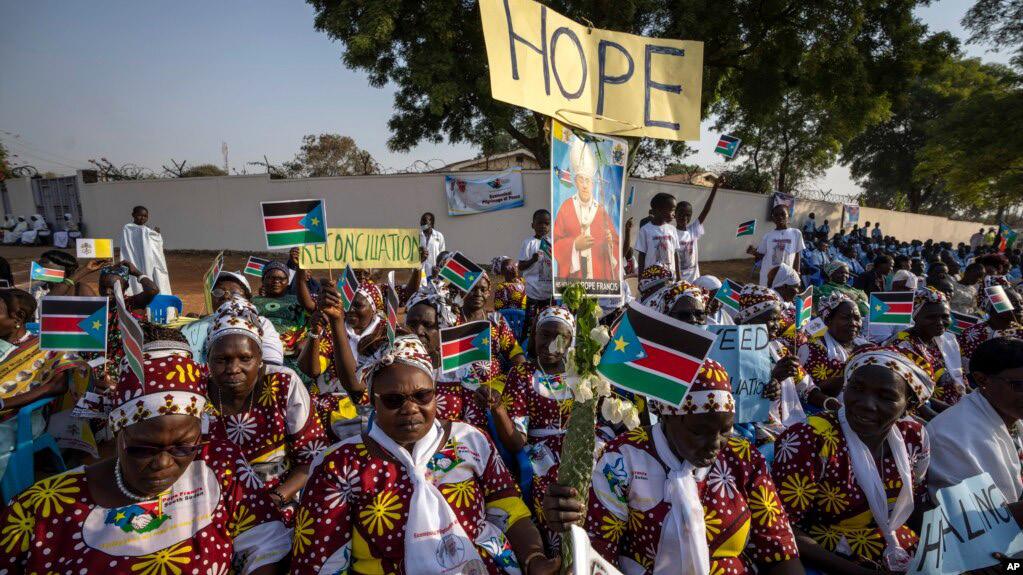
The country continues to grapple with the dilemma of either hastily navigating transitional processes, potentially repeating past disregard for popular will and exacerbating conflict, or extending the transitional arrangement, thereby bolstering the authority of leaders who have consistently failed to secure lasting peace, writes Maggie LoWilla
16
ECOWAS trying to find its footing in a multipolar world
The recent retreat from liberal democracy and growing instability in the West Africa sub-region and the wider African continent is taking place within a complex and dynamic global landscape, argues AbdulFatau Musah
32
Unlocking the region's mineral potential: Ghana leads charge in value addition efforts
In this comprehensive analysis by Jon Offei-Ansah, explore how Ghana and other African countries are spearheading efforts to add value to their mineral exports, propelling economic growth, and fostering sustainable development across the continent
40
In his insightful analysis, Ojo Emmanuel Ademola explores the multifaceted strategies for navigating high inflation, including leveraging technology, citizen responsibility, and historical perspectives 08
Navigating high inflation: strategies for economic stability
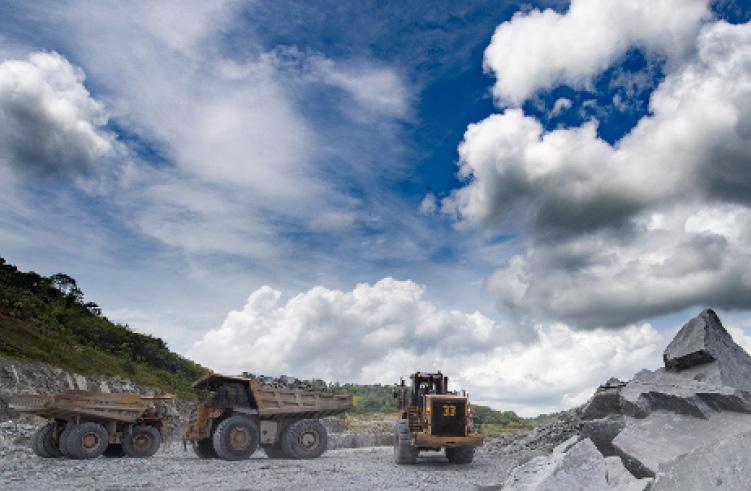
44
32
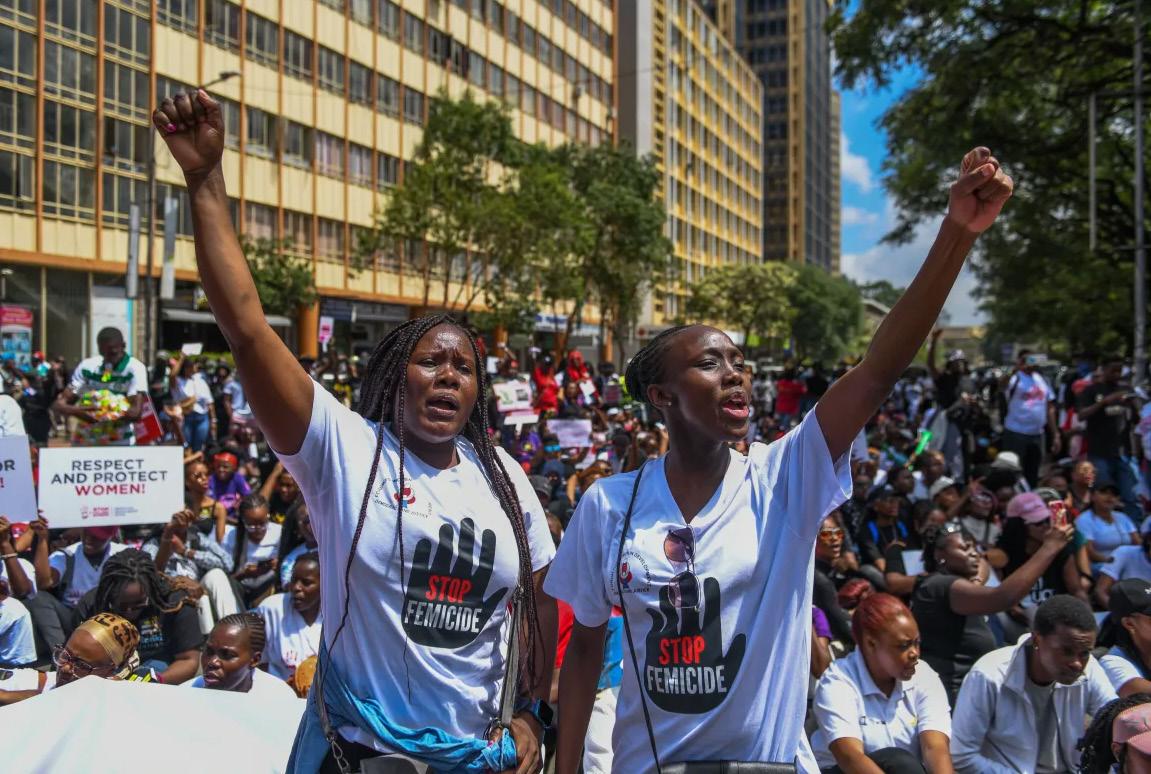
44
Femicide in Kenya: a gendered injustice
The deliberate killing of women in the Kenyan context is a deeply-rooted societal issue that intersects with geographical location, class, age and sexual orientation, argues Merceline Odhiambo
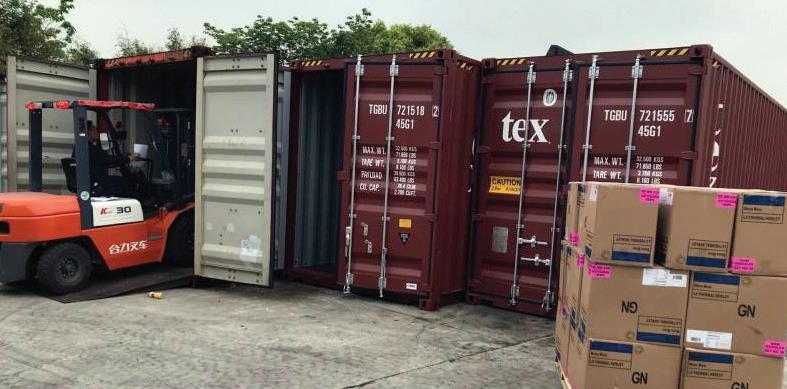
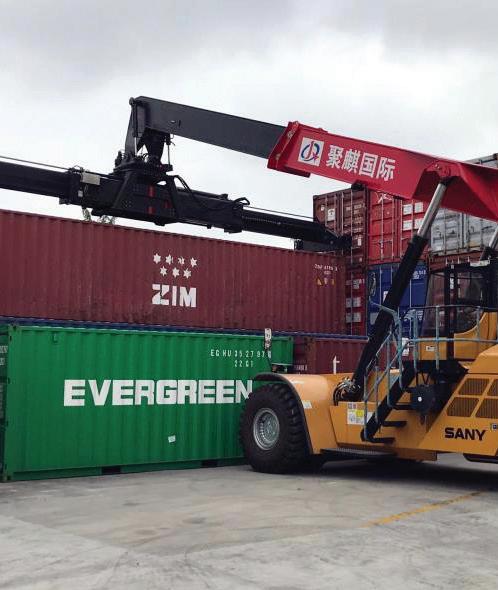
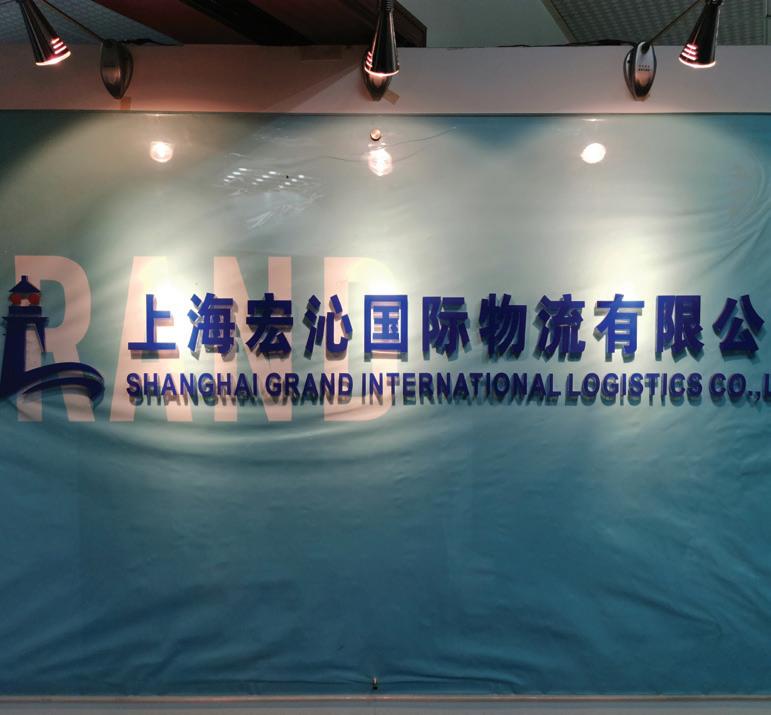
Established in 2002, Shanghai Grand International Co., Ltd. offers a variety of shipping and transportation options via air, sea and ground. Our company is based in Shanghai, China, with branches across the nation. Ranging from customs declaration, warehouse storage, containers and consolidated cargo shipping we have a large array of options to meet your needs.
In addition to being approved and designated by the Ministry of Transportation of China as a First Class cargo service provider, we have also established excellent business relations with major shipping companies including Maersk, CMA, ONE, SM line, and
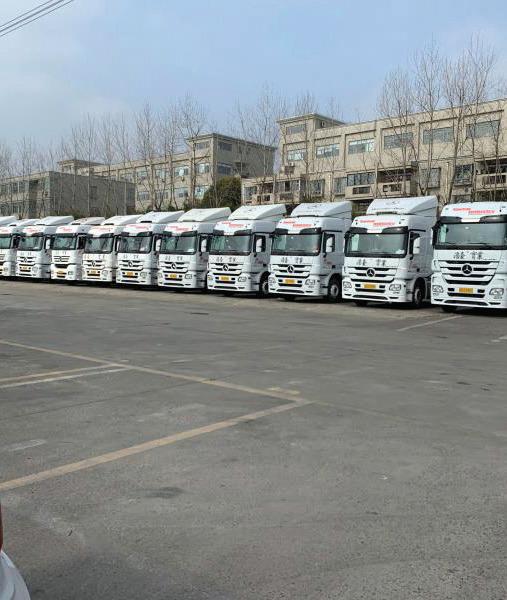
EMC over the past 15 years. In addition we have also built long term business relations with major airline cargo departments.
In order to expand our global operation, we are looking for international partnerships to work together in this industry.
Should you ever import any goods from Peoples Republic of China please ask your exporter and shipper to contact us. We will provide our best service to you.
Room 814, 578 Tian Bao Lu, Shanghai, Peoples Republic of China
E-Mail: felix@grand-log.net
phone: 86-13501786280
ON April 11, 2019, after 30 years of the dictatorship of Omar al-Bashir in Sudan, a people’s uprising forced the Sudanese Armed Forces (SAF) to remove him from power. A hybrid council of civilians and soldiers took charge, with a former economist at the Economic Commission for Africa, Abdalla Hamdok, as the titular head.
Ordinary Sudanese thought this would change their lives for the better. They were mistaken.
Four years on, the country is in the midst of a devastating civil war. The opposing sides are led by two members of the armed forces that had enforced al-Bashir’s genocidal regime: General Abdul-Fattah al-Burhan, Commander of the Sudanese Armed Forces (SAF), and Mohammed Hassan Dagalo, also known as Hemedti, leader of the Rapid Support Forces (RSF).
When Hamdok was head of the council, he did his best to address the chaotic state of the Sudanese economic. The soldiers were not impressed and ousted Hamdok in October 2021, a move orchestrated by al-Burhan and Hemedti who, under pressure from the people, reinstated Hamdok a month later. But in January 2022, he gave up and resigned.in a bid to quieten the growing unrest.
The soldiers took charge. Burhan and Hemedti were at the helm, with the SAF leader becoming the de facto head of state. They were supposed to direct Sudan’s democratic transition but this was blown sky high when the two forces launched attacks against each other on April 15, 2023.
The conflict is primarily a power struggle between the two megalomaniacs and their forces, as they now focus more on taking charge of the state and its resources while the humanitarian conditions become worse. These two have wreaked so much havoc in Sudan that the portents are ominous: the country could be heading the same way as Somalia after Siad Barre lost power in 1991.
All the signs are there. The World Health Organisation has announced that Sudan is currently facing the world’s
largest displacement crisis. Almost 8.5 million people, including some two million who have fled to neighbouring countries, have been forcibly displaced and face uncertainty, vulnerability and immense challenges.
Around 10,000 Sudanese have died in the conflict and there has been monumental destruction of infrastructure around the country. Since the escalation of hostilities last April, millions of people across the country remain unreachable by humanitarian partners, according to the WHO.
The Darfur region is in a critical position. The WHO said no direct humanitarian access had been possible for several months, and only limited aid was reaching people in these areas. Most health facilities have been looted, damaged or destroyed. In West Darfur, the local health system has essentially ground to a halt.
This is extremely serious. Throughout al-Bashir’s presidency, his paramilitary force, the Janjaweed, carried out ethnic cleansing in the states in the Darfur region. This group is now the RSF under Hemedti. It is difficult to fathom what is going on there now under the chaotic circumstances in which hard-pressed humanitarian agencies are supposed to act.
The SAF recently prohibited crossborder humanitarian assistance from Chad
Arabia, and signed by representatives of the SAF and RSF on May 11, 2023, is not working. Clearly their commitments and obligations to protect civilians and implement a ceasefire no longer hold and they are now fuelling the conflict. What al-Burhan and Hemedti do not realise is that they are creating a climate that will eventually lead to a Somalia situation; whereby regions will decouple themselves from the Sudanese state to become “independent” entities.
Attempts to broker a ceasefire have failed to achieve lasting peace. The African Union, which set up a threemember High-Level Panel for the Resolution of the Conflict in Sudan, is not making any headway
The AU is needed now more than ever to aid Sudanese civil society groups, including women, who are actively supporting local initiatives and empowering the younger generation to engage in humanitarian actions. But can the pan-African body make a difference?
It is struggling with credibility on the peace-making front. It has a peace fund of almost $400 million that does not seem to be making a difference on conflict resolution on the continent. We mentioned the similarity of the situation in Sudan to that of Somalia more than 30 years ago: a failed state. The AU peace mission has
In Sudan, the AU appears to have outsourced peace-making to the US and Saudi Arabia ‘ ’
while also obstructing assistance from reaching communities in areas controlled by the RSF. The RSF, on their part, have been accused of looting homes, markets and humanitarian assistance warehouses in areas under their control, while both sides are harassing humanitarian workers and hindering delivery of lifesaving aid.
The Jeddah Declaration of Commitment to Protect the Civilians of Sudan, brokered by the US and Saudi
failed in Somalia, not to talk of Central African Republic and Mali. And it was helpless to do anything in its own host country when the Tigrayan conflict blew up in Ethiopia.
As for Sudan, despite the AU’s High-level Panel, it would appear that the organisation’s Peace and Security Council has outsourced the problem and handed peace-making to the US and Saudi Arabia. AB
THIS Year’s Africa Week organised by the African Leadership Centre (ALC) at King’s College London in March focused on how the continent was gearing up to meeting the challenges emerging from the ongoing transition from a unipolar to a multipolar world. The academics posited that in recent years, the shift in the global geopolitical order had seen a decline in “Western” dominance and influence. Now, Global South actors including China, India, Russia, the United Arab Emirates and Saudi Arabia are challenging this unipolarity.
This shift is having implications for the African continent, the academics argue. They say this transformation has opened up the space for African countries to navigate the nature and range of their partnerships, including in some instances taking their own, or unified, positions around specific issues or adopting a nonaligned stance.
But are African countries ready to
constitutional manipulation for regime survival; and other governance ills that are the bane of the continent’s peace and security challenges.
“Africa cannot exercise agency without concerted and proactive leadership. On both fronts the deficits are glaring.”
The continent needs to address the collapse of its institutions of regional and continental governance, Mahmoud points out. Take the African Union, for example. Is it really taking the lead in effectively promoting Africa on the world stage?
Unlike the European Union, the AU does not exercise supranational power even though its Constitutive Act of 2000 encourages it to be more pro-active on this matter. The Pan-African body, it would seem, is awash with little pockets of resistance that are holding back progress.
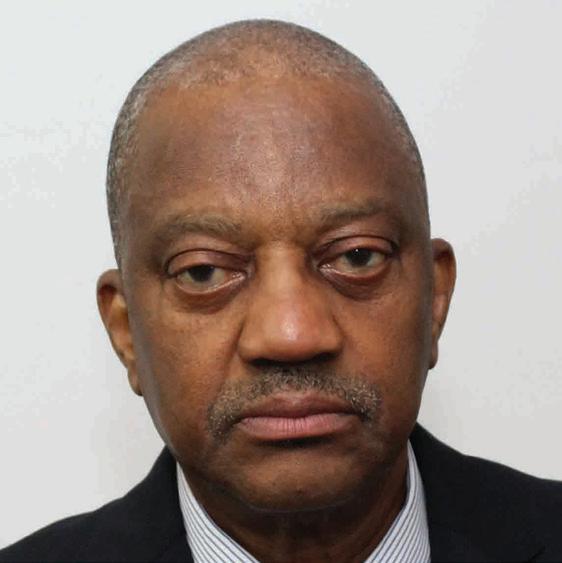
He continued: “Too often, there is an incoherence in decisions taken at the continental and regional levels. Africa is not a monolith. Member states will always have differing views. We should not pretend these differences do not exist, but should focus on finding a middle ground.
“Here, we should keep in mind the global context. The world is facing unprecedented crises, and everyone is impacted, without any exception. We therefore have to — more than ever — depend on each other.”
In Kagame’s eyes, it appears that the AU does not know whether it is coming or going. “Decisions taken at the level of heads of state continue to be revisited and revised, or even resisted, by some members of the Permanent Representatives Committee, which should really be unacceptable. We even see parallel structures created, whose main purpose seems to be to frustrate and delay the reforms which the heads of state have suggested and put in place.”
stake a claim in this emerging world order?
For a start, Youssef Mahmoud, Senior Adviser at the International Peace Institute and leading practitioner at the ALC, made a pertinent point about Africa exercising agency. He said this would be depend on the continent’s ability to influence the behaviour, the decision-making and rules of others.
Africa has for a very long time been battling to make its voice heard in international affairs. The continent’s leaders have not taken kindly to being given short shrift when they try to state Africa’s case.
Mahmoud argued: “Africa cannot exercise leadership without genuine introspection: getting its house in order; putting an end to flawed elections;
In 2016, heads of state agreed to reform the AU, and placed the no-nonsense President of Rwanda, Paul Kagame, in charge of making the organisation fit-forpurpose. At the recent summit in Addis Ababa, Kagame presented his report card as he stepped down from the job.
He listed a number of failings that are still holding back the restructuring of the AU’s organs, and the division of labour between the Commission and Regional Economic Communities. It seems that the AU and RECs are not singing from the same hymn sheet.
Then there is the issue of the Assembly becoming a mere talking shop. Not mincing his words, Kagame said: “The Assembly agenda continues to be too lengthy, with many items that do not require the consideration of heads of state. If we want to be productive, we must prioritise the most important items, as we agreed at the outset of the institutional reform.”
The AU is even at sixes and sevens over the matter of who should represent the continent at the G20. “There seems to be a need to clarify the role of the Chairperson of the African Union in relation to the Chairperson of the Commission. This has become more important as we work out how Africa will be represented at the G20 and similar gatherings,” Kagame noted.
In this new multipolar world, the AU needs to buck up its ideas if it is to place the continent on a higher plane globally. As I have always argued, the world does not owe Africa a living.
Africans need to get it into their heads that no one will help them to achieve what they want for Africa. They are the only ones who will achieve this.
Africans must learn from the Chinese. They know what they want, and they know how to go about getting it. Many in Africa would do well to read Sun Tzu’s ancient text, The Art of War, the famous primer that the Chinese have been using with such telling effect globally. AB

For the first time in its 13 years of independence, the country is poised to hold a groundbreaking general election in December. Maggie LoWilla looks at power, politics and the pathway to what will be one of 19 elections in Africa this year
AS 2024 unfolds, elections take centre stage across the African continent, with *19 countries set for presidential or general elections. From the Sahel to southern Africa, these democratic exercises often herald transitions to civilian rule or signify power transfer.
However, concerns linger over incumbent dominance and potential manipulation of electoral processes, prompting critical reflections on the legitimacy of elections continent-wide. Against a backdrop of authoritarianism and constitutional crises in several African nations, the quest for genuinely “free, fair and democratic” elections assumes paramount importance.
After multiple extensions, South Sudan is poised for its first general election in December 2024, a significant milestone in the young nation's democratic journey since gaining independence from Sudan in 2011. There have been numerous challenges and unmet conditions outlined in the roadmap to a peaceful and democratic end of the transitional period: the 2018 Revitalised Agreement on the Resolution of the Conflict in the Republic of South Sudan (R-ARCSS). Although this extended the transitional period by 24 months in 2022, recent public opinion surveys underscore a widespread desire among South Sudanese, including religious and civil society leaders, for timely elections.
This eagerness reflects a fatigue with prolonged power-sharing arrangements among the ruling elite, highlighting the urgent need for citizens to exercise their democratic rights through the ballot box within a politically safe and secure environment.
The R-ARCSS laid out essential policy and institutional reforms aimed at fostering a conducive democratic environment. A significant focus of policy reform has been the passage of the National Elections Act
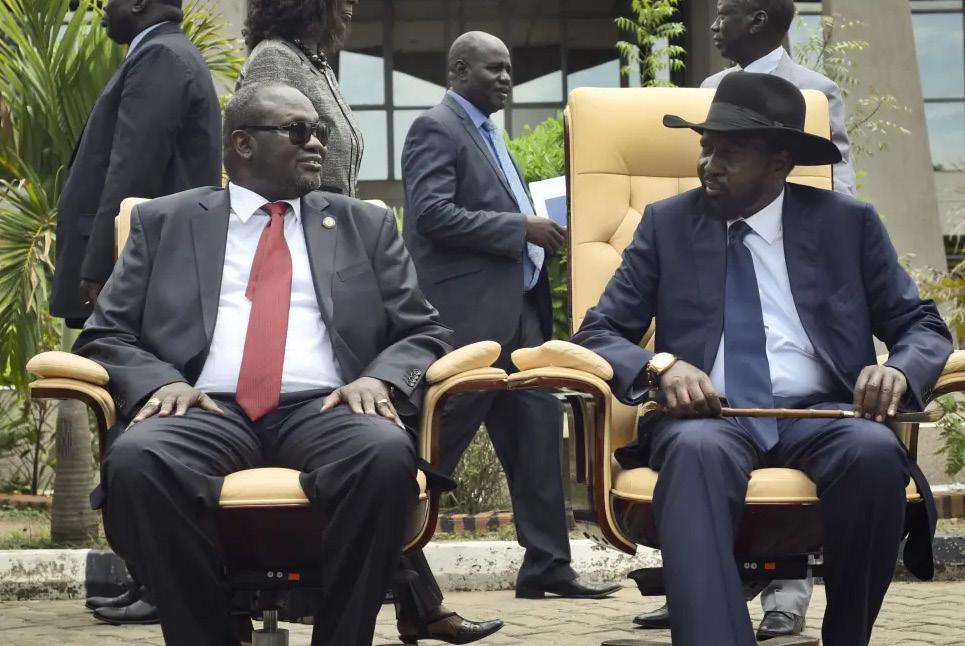
in 2023, which will be pivotal in ensuring geographical and gender representation on party lists. The Act seeks to ensure inclusivity and reduce the monopolisation of power by a single party.
Another crucial piece of legislation is the Political Parties Act (2012), which provides mechanisms for regulating South Sudan’s personality-driven political parties by upholding internal democratic governance and accountability standards within party constitutions.
Other key reforms include the constitution and reconstitution of vital institutions such as the National Elections Commission (NEC), the permanent and independent electoral management body charged with strengthening a democratic culture through free, fair and credible elections; the Political Parties Council (PPC), envisioned to strengthen political processes, mitigate conflicts through innovative dispute resolution, foster the development of political parties and actively engage the public in political affairs; and the National Constitutional
Review Commission (NCRC), tasked with overseeing electoral activities and ensuring compliance with democratic norms.
While this signifies progress, concerns have been raised regarding the impartiality of the NEC, particularly in relation to the perceived influence of the ruling political party, the Sudan People's Liberation Movement (SPLM), in the commission's composition and leadership.
Since independence, the SPLM has been the dominant political force in South Sudan. Originating as a liberation movement during the civil war, the SPLM transformed into a political party, wielding considerable influence over the country's political affairs. Regarding the upcoming elections, it is likely on the one hand that the SPLM, while desiring to retain its hold on power, may lack the necessary political will to commit to a credible, democratic electoral process. On the other hand, however, elections present an opportunity for the SPLM to legitimise and further consolidate its power.
The question of power has often

contributed to internal rifts within the SPLM, giving rise to breakaway factions. Most notable is the formation of the Sudan People's Liberation Movement-In Opposition (SPLM-IO), led by First Vice President Dr Riek Machar. In fact, the outbreak of civil war in December 2013 was the culmination of political tensions between SPLM forces loyal to President Salva Kiir and those aligned with Machar.
Alongside the 2013 and 2016 conflicts, other disgruntled factions surfaced, including the South Sudan Opposition Alliance (SSOA), Former Detainees (FD), and Other Political Parties (OPP). It could be argued that the emergence of some of these factions was a strategic manoeuvre to exploit the conflicts and subsequent military-elite peace negotiations to gain political power.
As signatories to R-ARCSS (2018), they were integrated into the Revitalised Transitional Government of National Unity (R-TGoNU) in line with agreed upon power-sharing arrangements. What is pertinent here is that some of these groups are not officially registered political entities. Their participation in the December elections hinges on their timely registration in accordance with PPC requirements, which state that parties seeking registration must be inclusive, with members from at least two-thirds of South Sudan's 10 states and three administrative areas. The comprehensive registration of unregistered political parties began on January 23, 2024, and will continue until June.
While the SPLM still dominates the South Sudan political landscape, there are several other political parties in the country such as the Democratic Forum, United South Sudan African Party (USSAP), Labour Party, Democratic Change, United South Sudan Party (USSP), Sudan African National Union (SANU) and United Democratic Salvation Front. As has been observed in other countries, political parties often form alliances in order to harness collective power and strengthen their bargaining position.
One instance of this is the establishment of the Coalition for Restoration of Democracy (CORD), which comprises exiled political leaders. CORD was established in response to perceived lack of political will to implement the R-ARCSS (2018) and insufficient

preparation for genuine elections.
The alliance made up of Revive South Sudan Party (RSSP), Common People’s Alliance (CPA), SPLM-IO Kitgwang, Steps We64, United Citizens for Change (UCC), and Red Army of South Sudan is underpinned by the value of “unity in diversity” and a commitment to advancing equality, freedom, justice and democracy in the country. It is likely that more of such coalitions will be formed as the elections draw nearer, suggesting some progress towards political pluralism.
Despite several strides made towards institutional and policy reform, South Sudan still faces significant hurdles in its electoral preparations. The absence of a permanent constitution, a prerequisite for conducting elections under the 2018 peace agreement, poses a critical challenge. Drafting a constitution requires thorough civic engagement and extensive public consultations.
Beyond time constraints, this process is further complicated by the nation's postconflict context, where special provisions are necessary to facilitate the participation of internally displaced persons, refugees and returnees. Additionally, the absence of a recent population census complicates voter registration and constituency delineation, necessitating strategic decisions by political elites to use existing boundaries or alternative data sources.
Moreover, violent conflict continues to plague South Sudan. Recently there have
been reported attacks in Western Bahr el Ghazal State and Abyei region, raising questions about the feasibility of holding elections under current conditions.
Alongside widespread insecurity, opposition figures, civil society members and journalists face frequent intimidation or imprisonment. The National Security Service is accused of entrenching a pervasive censorship system to suppress independent media and impose strict surveillance on civil society.
Numerous incidents of violence against journalists and activists, both within and beyond South Sudan's borders, including online attacks, occur frequently, without consequence for the perpetrators. This emphasises the need for a secure environment and safeguarding the civic and political space ahead of elections to ensure broad participation.
At the moment, the political situation in South Sudan demonstrates nuances involving advancements and enduring obstacles as the country gears up for its first-ever general election. While efforts to foster electoral integrity and inclusivity are underway, unresolved issues surrounding constitutional development, population census, political will and insecurity cast a shadow over the nation's democratic aspirations. Nonetheless, the emergence of political coalitions signals a burgeoning desire for change and accountability, underscoring the potential for democratic renewal amidst ongoing uncertainties.

The country continues to grapple with the dilemma of either hastily navigating transitional processes, potentially repeating past disregard for popular will and exacerbating conflict, or extending the transitional arrangement, thereby bolstering the authority of leaders who have consistently failed to secure lasting peace, writes
Maggie LoWillaIN 2011, South Sudan became the world's youngest nation, following decades of civil war with Sudan. This dawn of independence sparked optimistic aspiration for the flourishing of democracy and lasting peace in the newly formed country. However, since then, the country has witnessed relapse into previous states of conflict.
This was first marked by the country’s descent into civil war from 2013-2015 and 2016-2018. These conflicts were ultimately resolved through peace processes, resulting in the Agreement on the Resolution of the Conflict in the Republic of South Sudan (ARCSS, 2015) and the subsequent Revitalised Agreement on the Resolution of the Conflict in the Republic of South Sudan (R-ARCSS, 2018).
The peace processes were underpinned by the liberal peacebuilding model, emphasising the importance of establishing democratic institutions, promoting human rights, and adopting marketoriented economic reforms to foster peace and stability in post-conflict societies. However, it is evident that the democracypeace paradigm is nuanced, facing challenges and contradictions.
In the pre-colonial era, Southern Sudan largely existed outside state control. However, this quickly changed with the emergence of a centralised state under the Turco-Egyptian regime (1821-1885) and the rise of the slave trade and economic exploitation. This was followed by the Mahdist regime (1885-1898) which continued slave raids into southern territory.
Throughout the colonial era (1899-
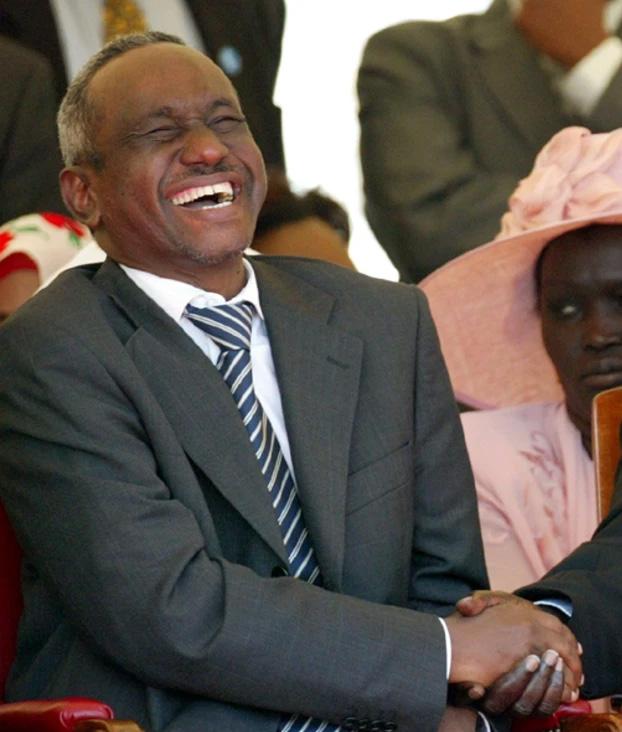

1956), British policies exacerbated the division between northern and southern Sudan. This was evident in the preferential allocation of resources to northern Sudan and the imposition of restrictions on contact, interaction and trade between the two regions, deepening socio-economic disparities. Furthermore, under indirect rule, formerly fluid ethnic identities were shaped and cemented by colonial interpretations.
Upon gaining independence in 1956, Sudan lacked proper consultation and agreement among the integrated regions. The absence of a national consensusbuilding process through constitutional means set a precedent of neglecting popular will.
The politics of exclusion during this period favoured a small segment of the
In the pre-colonial era, Southern Sudan largely existed outside state control
population, marginalising the masses from governance. This catalysed the onset of violent elite-society interactions, notably marked by the Anyanya I Rebellion (1955-1972) commonly known as the First Sudanese Civil War.
The insurgency concluded with the Addis Ababa Peace Agreement in 1972, which granted regional autonomy.
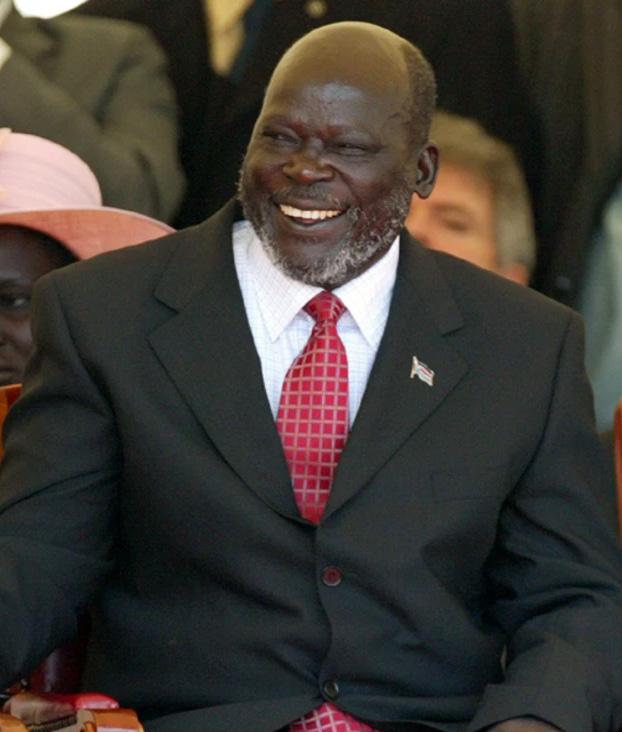
However, this peace was short-lived, as conflict reignited in 1983 when President Nimeiri imposed Shari’a law to appease Islamist politicians. Led by the late Dr John Garang de Mabior, head of the Sudanese People’s Liberation Movement/ Army (SPLM/A), the second insurgency was underpinned by his vision for a democratic New Sudan.
He advocated for a unified, secular state, seeking to dismantle political identities based on conquest, replacing them with a consensual national identity. The goal was to challenge the political supremacist connotations of Arabism and decentre Islam from governance, ensuring accurate representation of the diverse composition of Sudan’s population. Additionally, he envisioned the establishment of a Sudanese socio-political order based on equal standing regardless of religion, race, ethnicity, gender or place of origin.
Despite the ideals and promise of New Sudan, it became less prominent, especially after Garang’s untimely passing in July 2005. Subsequently, South Sudan gained independence in January 2011, following a referendum that witnessed 98.83 per cent of South Sudanese vote for secession from North Sudan.
Following its independence, South Sudan struggled to build a national identity after the perceived defeat of its common enemy, Sudan. The absence of racial and religious distinctions from the politically dominant North led people to coalesce around sub-national ethnic identities.
This transition was anticipated, considering that a significant portion of the social and political landscape is centred on ethnicity. Despite this familiarity, the trust between different ethnic groups remained fragile, perpetuating “us” versus “them” dynamics.
Furthermore, with the establishment of a new state, ethnic rhetoric emerged to rationalise varying access to peace dividends, emphasising the roles of specific

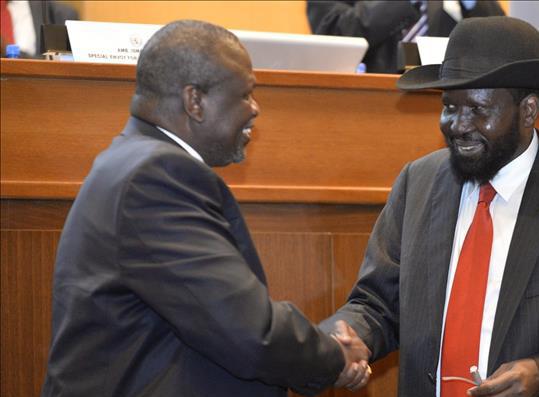
ethnic groups in the liberation struggle. This narrative gave rise to notions of ethnic supremacy, particularly among the Dinka and Nuer, reminiscent of the previously perpetuated racial superiority by the North. The ethnic disposition of the South Sudanese state further fuelled patrimonial politics dominated by the SPLM/A, expanding its influence when it assumed the supreme governing role of the state.
The SPLM/A's exclusionary governance mirrored the authoritarian tendencies of the Khartoum regime, leading to debates about federalism. Historically marginalised communities, experiencing land dispossession and exclusion from the benefits of an independent South Sudan, were proponents of federalism.
However, some experts argued that decentralisation might exacerbate conflicts over smaller boundaries. The discourse on federalism is yet to be settled and is an
ongoing point of contention.
It is important to note that most ethnic groups had their own forms of administration including chiefs, elders and young men (warriors) who served the role of protecting their community. While the warriors primarily served their own communities, they would sometimes serve at the behest of the state.
For example, armed Dinka cattleraiders have alternately been integrated into the state, engaged in competition with the state, and been enlisted to safeguard state officials’ cattle. Similarly, the Nuer pastoralist group, often referred to as the "White Army", was originally formed to defend the community cattle against raids. The group has evolved over time, participating in violence across phases of South Sudan's conflicts.
These groups derive legitimacy and influence from cultural norms that highly value their capacity to protect
their communities. Also noteworthy is the historical engagement of the Toposa warriors from Eastern Equatoria, who fought for and against the SPLA during the Second Sudanese Civil War, contingent on the SPLA's ability to provide food and weapons. The willingness of young warriors to participate in violent conflict in exchange for material rewards points to the commodification of violence in South Sudan. It also adds a layer of complexity to transitional processes of Demobilisation, Disarmament and Reintegration (DDR) and Security Sector Reform (SSR), where the army is more malleable and not an exclusively arm of the state.
The task of developing the capacity to handle internal security amid ongoing inter-communal conflicts, addressing the presence of armed groups, and effectively managing the country's resources to provide basic services was primarily delegated to the international community.


This resulted in the absence of key elements essential for a functioning nationstate.
Despite the attempt to integrate numerous pre-independence militia into the SPLA, their organisational structures and command remained largely unchanged. SPLA units continued to be divided along ethnic and factional lines, with their former militia leaders assuming commanding roles as generals. In fact, the escalation of the 2016 conflict can be partly attributed to the blurred lines between state and communal violence.
The Comprehensive Peace Agreement (CPA) signed in 2005 between the SPLM and the government of Sudan was a pivotal moment for South Sudan, leading to its independence in 2011. However, the CPA faced criticism for not adequately addressing internal tensions within South Sudan, neglecting issues like governance, corruption and resource distribution. The rushed implementation, particularly in
integrating the SPLA and the Sudan Armed Forces (SAF), posed challenges in building unified security forces.
The DDR programme, crucial for the reintegration of ex-combatants, was a vital component of the CPA. Despite having clear objectives, such as preparing excombatants for civilian life and reducing weapons proliferation, the programme faced various challenges. Hasty crafting of the CPA and a lack of detailed planning for DDR implementation contributed to the programme's shortcomings.
The process lacked full community involvement, assumptions were made without considering the complex environment, and funding issues arose. Ultimately, less than a quarter of the DDR target was reintegrated, leaving many excombatants unemployed and susceptible to joining rebel groups.
The CPA and its accompanying peacebuilding initiatives failed to formulate a strategy for guiding the leaders and the populations of South Sudan towards a shared national vision. The leaders of the newly independent country directed their focus and resources primarily on the conflict with the North and the pursuit of individual interests.
The CPA's objectives were not fully realised due to several factors, including a lack of political will, tensions among stakeholders, limited and delayed funding, economic challenges, lack of inclusion, and false assumptions. Furthermore, the exclusion of key stakeholders from negotiations and implementation contributed to the Agreement's limitations. Therefore, though the CPA aimed to prevent violent state disintegration, it failed to bring lasting peace.
The Agreement on the Resolution of the Conflict in South Sudan (ARCSS), facilitated by the Intergovernmental Authority on Development (IGAD) in
2015, aimed to bring an end to the internal conflict in South Sudan that broke out in 2013. However, the implementation of the agreement faced significant challenges, leading to a resurgence of violence.
The power-sharing arrangement between President Salva Kiir and Vice President Dr Riek Machar faltered, and the peace process lacked inclusivity, marginalising key stakeholders like civil society and women. South Sudan's weak institutional infrastructure and a new and fragile governance culture further complicated the state-building process.
The ARCSS faced scrutiny for being a flawed and controversial peace deal, exacerbating tensions and power struggles. The history of conflict between the primary conflicting parties led to selective implementation and violations of the agreement, contributing to renewed conflict.
The mediation process itself was marked by deficits in preparedness, consent, impartiality, inclusivity and strategy, reflecting an unusually challenging context. Regional actors, notably IGAD's frontline states, had competing national interests that outweighed their potential contribution to the peace process.
While the IGAD-led peace process may have slowed South Sudan's civil war and initiated discussions on necessary transformations, the peace deal lacked political will, broad national ownership, and specific implementing authorities. The principal combatants often demonstrated hostility toward negotiated settlements, which should have been an indicator of its impending failure.
The Revitalised Agreement on the Resolution of the Conflict in South Sudan (R-ARCSS) was signed in 2018 to resolve the 2016-2018 conflict. It is a revised version of the ARCSS, which aimed to

rectify the flaws of its predecessor.
Unfortunately, it encountered similar challenges during implementation. Moreover, the agreement is often perceived to have been the outcome of external pressure from the international community and regional mediators, leading to fragility in power-sharing mechanisms and ongoing delays in implementation.
The agreement aimed to establish a permanent ceasefire, ensuring full implementation, and transitioning to democracy in the post-transitional period. However, critics raised valid concerns that the allocation of state power to non-state actors could potentially lead to insurgent violence, as evidenced in the ARCSS process, where contenders vying for power resorted to violence in the hope of exploiting peace negotiations.
While the R-ARCSS has prevented another full-blown civil war and initiated transitional institutions, challenges persist as political will for socio-economic justice reforms is insufficient. There are trust deficits among parties to the agreement, institutional capacity gaps,
ongoing intercommunal violence, military defections, flooding, and humanitarian crises.
In fact, the humanitarian situation continues to worsen due to the influx of returnees and refugees fleeing the conflict in Sudan, coupled with food insecurity, climate-related shocks and violence. This highlights a limitation in the liberal peacebuilding model, where an excessive focus on institution-building tends to overshadow the basic needs of ordinary citizens and fails to deliver on the promise of peace.
All three political settlements were largely elitist and, in their implementation, have faced challenges related to a lack of political will, the persistence of ethno-political divisions, competition for resources, absence of effective DDR, inadequate implementation mechanisms, limited local buy-in and insufficient international oversight. The rushed and externally driven nature of these agreements often ignored the complex historical and socio-political dynamics within South Sudan.
In August 2022, signatories to the R-ARCSS agreed to extend the transitional period by 24 months. This included actions to be taken towards the completion of the outstanding tasks in the R-ARCSS and corresponding timeframes.
The roadmap agreement, while it may be seemingly reasonable, could also be perceived to be an opportunity for political actors to prolong their claim to power and access to state resources. In fact, this was a concern expressed by members of civil society, encompassing women’s groups, youth groups, persons with disabilities, human rights organisations, survivor groups, and academia, from across South Sudan and the diaspora who gathered in Dar es Salaam, Tanzania from November 21-23, 2023 to discuss the direction of South Sudan’s transitional process. The outcome of their discussion was a resolution titled: Civil Society Resolution on the Transitional Process in South Sudan. It agreed the following:
• “First, we need the killings, abductions, disappearances, torture, and sexual and gender-based violence (SGBV) to stop


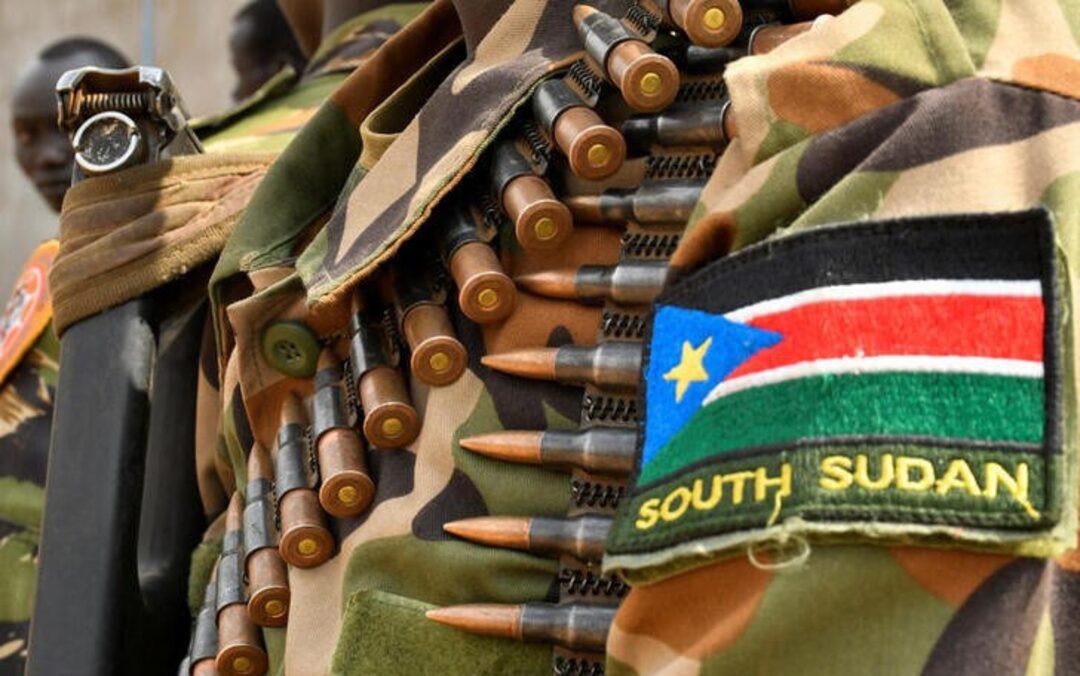
• “Second, we must prevent the recurrence of war in South Sudan. We cannot forge a nation through the barrel of a gun
• “Third, meaningful peace can only be achieved through inclusive, participatory, and people-centred processes. When given the space to deliberate on how we will coexist peacefully, the people of South Sudan have demonstrated time and again that they have the wisdom and capacity to solve their own problems. Conversely, when decisions are forced upon us by a small political and military elite, it has only generated more violence.”
The last paragraph echoes this article’s earlier critique on the elitist nature of previous political settlements. The narrow focus centred on power-sharing and institution building, rather than broader social, political and economic empowerment has contributed to the rise of a ruling elite prone to rent-seeking, driving a wedge between state and society.
South Sudan’s political and military elite have mastered the manipulation of
Western dominated peace processes for their personal gain, at the expense of the people, resulting in what appears to be a never-ending pursuit of an elusive peace.
South Sudan’s post-independence experience demonstrates the challenges of imposing liberal formulas of state building on a traditional and deeply illiberal society. The assumption that the mere presence of democratic institutions guarantees peace overlooks underlying issues such as ethnic cleavages, identity politics, proliferation of armed groups and power struggles. With the unresolved historical tensions, elections can easily become a flashpoint for violence rather than a mechanism for peaceful transition.
While certain aspects of the model have contributed positively to the state's recovery, its weaknesses and challenges highlight the need for a more nuanced and context-specific approach. As the state navigates its path towards stability, addressing historical injustices and fostering local ownership in peacebuilding, efforts are essential for fostering a resilient and lasting peace.
Furthermore, it is critical that the state dedicates efforts towards defining a unified vision, values and collective aspirations of the South Sudanese people. Without effective leadership and a clear vision for sustainable peace, it will be even more daunting for both internal and external actors to unite around a strategy to advance such an agenda.
As the countdown to elections approaches, South Sudan stands at a crucial juncture. It must grapple with the dilemma of either hastily navigating transitional processes, potentially repeating past disregard for popular will and exacerbating conflict, or extending the transitional arrangement, thereby bolstering the authority of leaders who have consistently failed to secure lasting peace.
The South Sudan dilemma presents an intricate challenge, serving as a pivotal case study that demands deeper contemplation and a re-evaluation of Western assumptions. It alludes to the fact that achieving sustainable peace in postconflict societies requires approaches that authentically align with the unique nuances and experiences of the particular context.
The recent retreat from liberal democracy and growing instability in the West Africa sub-region and the wider African continent is taking place within a complex and dynamic global landscape, argues Abdul-Fatau Musah
THE primordial raison d’être of the Economic Community of West African States (ECOWAS) as captured in its inception Treaty of May 28, 1975 was, simply put, economic integration, underpinned initially by the Protocol on Free Movement of Persons, services and goods of 1976. The contemporary ECOWAS ethos was born out of adversity – the upheavals that heralded the end of the Cold War in 1989.
The temporary shift towards a unipolar world under Pax-Americana amidst hopes for greater multilateralism also coincided with the virtual collapse of weak states in parallel with the rebirth of liberal democracy in Africa, due principally to pressures from below against autocratic, dictatorial and military rule, amidst the weakening of external protection for such regimes. The civil wars in Liberia, Sierra Leone and Cote d’Ivoire (1989-2003); and the National Conferences gave birth to liberal and illiberal democracies via multiparty elections.
ECOWAS’ pivot towards security engagements brought into sharp relief the obvious nexus between security and development. The ECOWAS Authority codified the lessons learned from the painful experiences into an array of impressive normative instruments to guide Community behaviour. Key among these instruments were the Declaration of Political Principles (1991), the Revised Treaty of 1993, the Protocol relating to the Mechanism for Conflict Prevention, Management, Resolution Peacekeeping and Security – the Mechanism-(1999) and the Supplementary Protocol on Democracy and Good Governance (2001).
Against the backdrop of recent developments in the region, it is necessary to stress the conflict prevention, management and peace sustaining essence

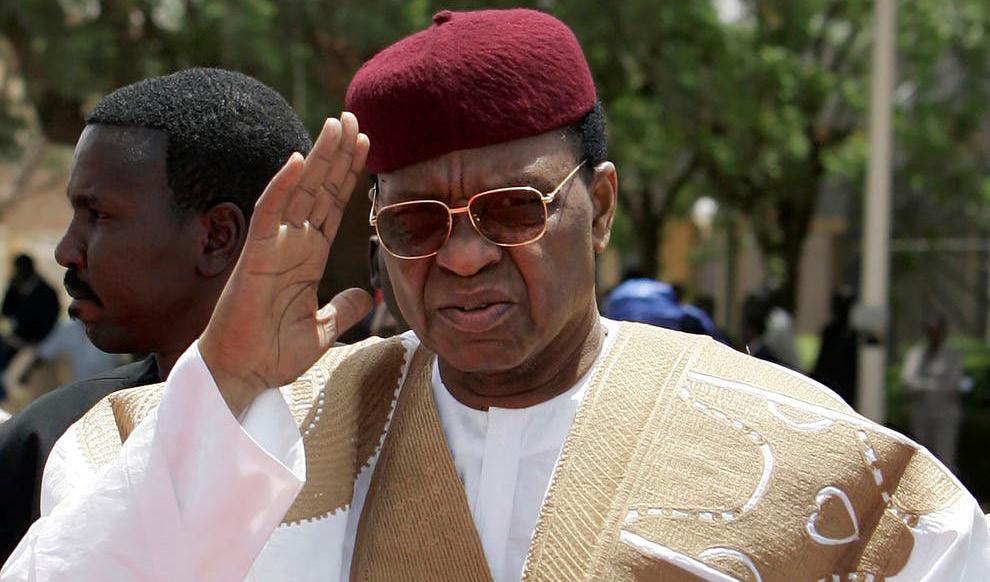
of the Mechanism and the Supplementary Protocol. The latter, among others, outlines the Constitutional Convergence Criteria for ECOWAS membership based on liberal democratic principles (Section 1): secularity of the state; separation of powers; independence of institutions; elections as the means of acceding to power; and enjoyment of broad freedoms.
It outlines the regalian role of the military, the police and security forces (section IV). Most importantly, the Supplementary Protocol declares zero tolerance for power obtained or maintained by unconstitutional means and imposes specific sanctions on errant member states (Art. 45; further expanded in the Supplementary Act of 2012).
A watershed moment in the evolution of ECOWAS was the transformation of the ECOWAS Secretariat into a Commission in 2007, imbued with supranational attributes and tasked with leading Community efforts towards Vision 2020, the overarching goal of which was to transform the sub-region from an ECOWAS of states to an ECOWAS of peoples.
By the end of 2020, with a view to enhancing national ownership of the regional integration agenda and taking inspiration from the African Union Agenda
The façade of democracy was unfortunately also underpinned by serious governance and development deficits ‘ ’
2063 and the UN Sustainable Development Goals under Agenda 2030, the Community set new goals under Vision 2050. This was aimed at further realising the ECOWAS of Peoples by achieving: “A fully integrated Community of peoples, living in a peaceful and prosperous region, with strong institutions and respect for fundamental rights and freedoms, striving for inclusive and sustainable development.”
The façade of democracy was unfortunately also underpinned by serious governance and development deficits: marginalisation, youth unemployment, ethnic and religious tensions. The end of the first decade and the beginning of the second
of the 21st century witnessed accelerated instability characterised by the impacts of the Ebola and COVID pandemics, financial, food and social crises, governance deficits and intensification of terrorism and violent extremism, and the re-entry of the military into politics. At least nine successful and failed military incursions into politics have occurred in West Africa since 2021, with four countries currently under military rule: Mali, Guinea, Burkina Faso and Niger.
In an unprecedented move, three of the member states under military rule jointly declared their intention to withdraw their membership of ECOWAS, the first time since Mauritania in 2000. It must be told,
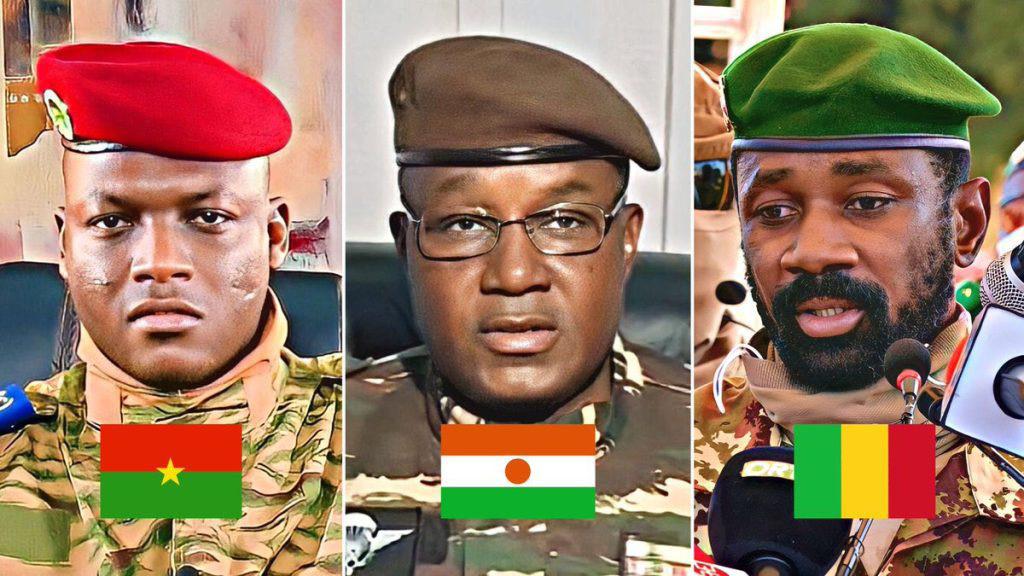
however, that on February 18, 2010, the coup d’état against President Mahamadou Tandja of Niger occurred in the course of an emergency Cabinet meeting to announce the withdrawal of Niger from ECOWAS. This followed the insistence of ECOWAS for the late president to relinquish power following the expiry of his two-term mandate.
The recent retreat from liberal democracy and growing instability in the West Africa sub-region and the wider continent is taking place within a complex and dynamic global landscape characterised by an unprecedented convergence of threat vectors, namely geopolitical and geostrategic shifts, economic downturn, currency fluctuations, digital advancements and misuse, climate and environmental concerns and changing socio-cultural dynamics. Globally, liberal democracy is on the retreat everywhere with the rise of neoconservatism and nationalism. Even traditional mainstream political forces in Europe and elsewhere are pivoting towards populist, anti-migrant rhetoric as they progressively cede political ground to extremist forces.
On the geopolitical and geostrategic front, three broad tendencies can be discerned: tensions between liberal democracy forces and the push towards autocracy/military dictatorship; the
Jihadist agenda to create Caliphates on the continent, instrumentalising faith and identity while asserting illegal control of natural resources; and contradictions between growing interdependence and collapse of multilateralism amidst inexorable rise of multipolarity.
In the dynamics between the NATO Powers (Collective West); the BRICS Axis (China, Russia, India; complicated by the stakes of Medium Powers (Turkey, Saudi Arabia, UAE, Qatar) and North African rivals (Algeria and Morocco), we see the threat posed by the possible return to proxy wars akin to the Cold War experiences from 1945 to 1989.
Meanwhile, there are governance and development deficits such as state capture, economic mismanagement, currency instability, retreat from the periphery, marginalisation and selective provision of basic services. There has also been a retreat into identity politics; corruption and the erosion of the social contract between the citizenry and the state.
The aim is to suppress dissent and enable unconstitutional maintenance of power through the manipulation of constitutional and electoral norms; weaponization of the judiciary; and the instrumentalization of security forces
Going forward, there is a need to reconcile the tensions between democracy, governance and development through measures to enhance the inclusive production and equitable distribution of democracy dividends. Following the recent goodwill gestures by the ECOWAS Authority towards the three member states wishing to leave the bloc through the easing of sanctions and various engagements, the ball is in the court of the Alliance des Etats du Sahel (AES) to soberly examine the implications of their move with a view to perhaps reconsidering their position.
ECOWAS will continue to engage them towards this end. However, the region must not compromise on its strategic choice of liberal democracy and its core values and principles as enshrined in its instruments.
Thus, we must insist on the restoration of constitutional order in countries in transition: Mali, Burkina Faso, Guinea and Niger through dialogue and pressure. We must also combat the manipulation of constitutional and electoral laws for unconstitutional maintenance of power through reforms and social and peer pressure on leaders with such intentions.
We must also empower and unleash civil society and private sector agency in favour of democratic consolidation and inclusive economic development. The enhanced operationalisation of the
ECOWAS Conflict Prevention Framework (ECPF) and the establishment of an ECOWAS Economic, Social and Cultural Council (ECOSOCC) must be expedited.
We must strengthen counter-terrorism efforts with the activation of the ECOWAS Standby Force in its kinetic mode and the coordination of disparate counterterrorism efforts. In this regard, the timeliness of the recent UN Security Council Resolution authorising the use of assessed contribution to sustainably fund Africanled peace support operations cannot be overemphasised.
As a consequence of the latest developments, ECOWAS plans to engage in deep reflection with the participation of critical stakeholders on the fate of regional integration, democracy and governance in an era of multipolarity and an asymmetric conflict environment. There is a need to forge a new compact with external partners to prevent a new Cold War in Africa.
The issues raised above make any
single-factor explanation for the growing political and security malaise untenable. This author is of the view that military and dictatorial rule is not a viable alternative to electoral multiparty democracy. Empirical evidence in Africa between 1970 and 1990, as well as the struggles of current military regimes, makes that debate mute. Democracy in its post-Cold War iteration is only a generation old. It may have failed so far to deliver enough public goods, but it safeguards citizens’ rights and offers free choices; military and dictatorial rule guarantees neither development nor human rights. It is important that we all work with determination to prevent the region becoming anew an arena for proxy wars.
That said, the fledgling and stumbling liberal democracy in Africa requires urgent resuscitation through the infusion of local culture, traditions and realities; strengthening internal democracy, representativeness and issues-based programming of political parties;
promoting proportional representation to enhance inclusive governance; and the roll out of infrastructure, provision of basic services and adding real value to regional endowments through integrated industrialisation.
The organisation has arrived at a fork in the road of regional integration. What we do collectively based on sound analysis and action will determine which direction we take. Promoting and ensuring good governance and development requires the collective efforts of all – governments, the citizenry, their organisations and partners.
Citizen apathy is the accelerator of bad governance. The political, economic and social condition in the region is dire but not irreversible. Restoring confidence in governance in the region requires a compelling strategic approach, as well as a multidimensional, multi actor and multiagency effort by all critical local, national and regional actors in a strategic partnership with the African Union and the United Nations.
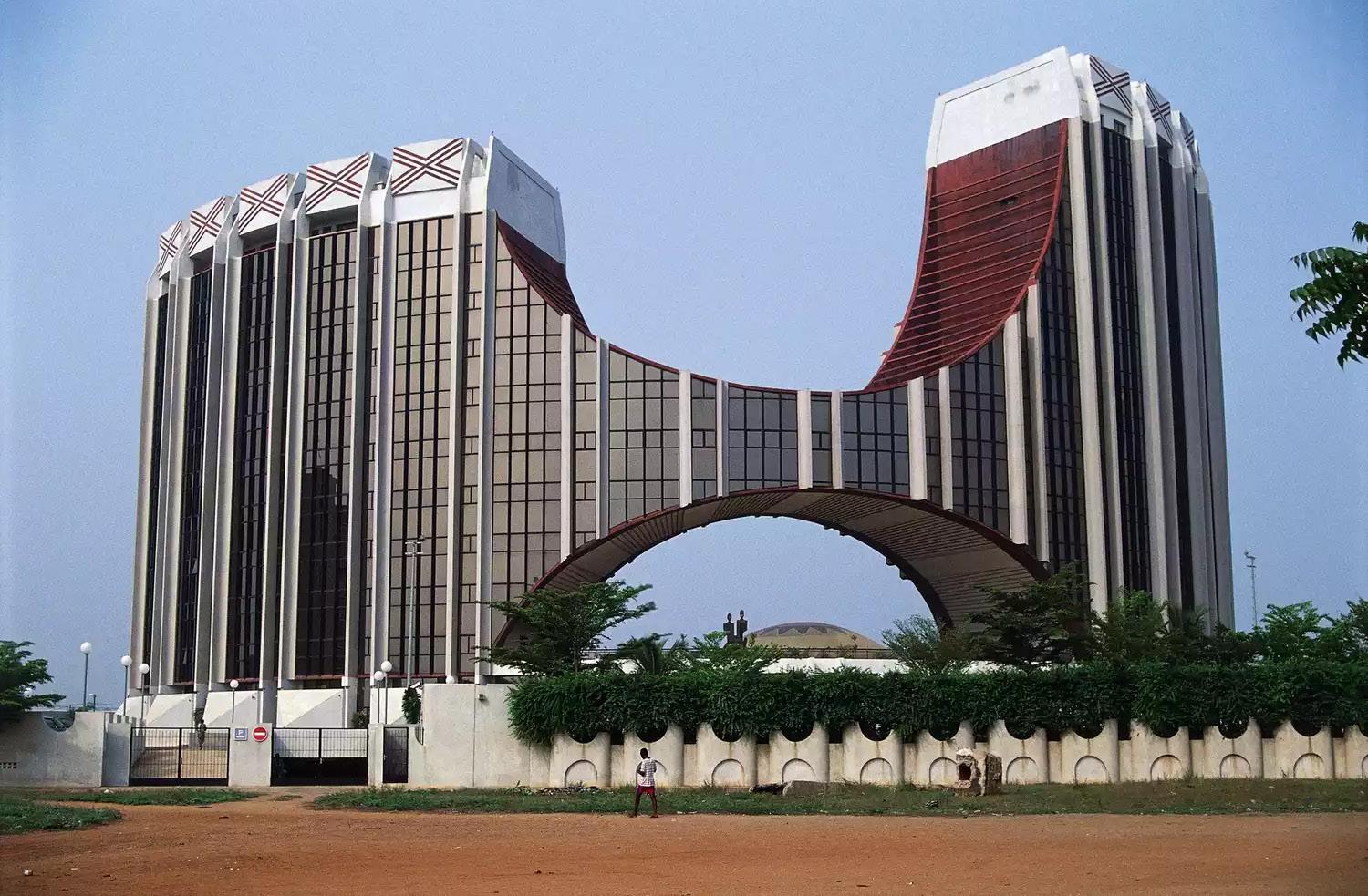
As the rules-based international order is being challenged to the core, with the institutions established to maintain international peace and security – globally, the UN, and regionally, the AU and ECOWAS – appearing to be on the backfoot, there is an opportunity to reposition the continent in a world order that is in flux, argues
‘Funmi OlonisakinTHE debate on the matter of whether African agency is for hire, for sale or renewal is occurring at a time of momentous change in the world. We have seen how failure to defend established norms when directly challenged or undermined by members, and perceptions of double standards in applying declared norms, are eroding global and regional governance. Examples of this abound among global institutions and African regional organisations. We now see how Africa’s once coveted normative framework, including its continental peace and security architecture, seems to be at odds with today’s changing realities.
But within this global disorder lies an opportunity for internal renewal and global repositioning for Africa. Reclaiming Africa’s agency will require both introspection and proactivity on the part of African leaders across all spheres.
It also means an interrogation of the structures shaping intra-African affairs and the terms of engagement of the emerging global (dis)order. This must however begin with acknowledging that African agency is caught in an uncertain and undecided space – a void.
The uncertainty is exacerbated by ambiguities about how Africa’s voice is projected, how African-led ideas travel, how the continent’s human and natural resources are leveraged, and the patterns and terms of Africa’s engagement in the global arena. But it is also the case that Africa’s engagement in the global arena is strongly mediated by established frameworks that connote certain forms
of agency and norms of engagement. Challenging these established ideas is the issue that confronts any effort to consolidate or convene Africa’s agency in its multidimensional forms for renewal of the continent.
The classical view of “agency” in international relations places Africa in a bind and limits both the influential expressions of agency and the possibilities of renewal of Africa’s agency.
Traditional ideas of agency are inherently problematic, making it difficult for African agency to be acknowledged in international relations.
The limitations of classical ideas are rarely acknowledged in mainstream discourse, particularly at the level of policy and practice. One key shortcoming of the classical approach is that it tends to focus on structures, the state and the elite as the actors which exercise agency.
But these ideas are gradually being challenged. The challenge to the state and elite centric view of agency is that where governing elite and people are not at one, it is difficult to transfer agency between them – at least not in a two-way flow of influence.
The time has come to examine African agency through an expanded (interdisciplinary) lens – one that offers deeper insights. Much of the literature and discourse has been about the role and influence of African states and elite agents, and not of African citizens and communities. African communities and groups outside of governmental capacity

are overlooked. This does not serve to provide a broader and more complex narrative through which African agency can be explored.
Thus, the state-centric focus provides, at best, only a partial and qualified view of the ways in which African agency is secured and exercised at the global level, particularly given the significant structural constraints imposed on Africa by global economic and political inequalities.
There is the view of African states being impacted upon negatively or otherwise by global powers or indeed individual African states and elite agents attempting to project themselves on the global stage. This is in contrast to African non-governmental, non-state agents impacting the world either by projecting Africa’s talents on the global
Summits with African governments are merely to boost the global image and standing of middle power countries ‘ ’
stage through creative engagement or impacting European politics through acts of dissent, protest and self-determination, by voting with their feet through migration across the Mediterranean. If these aren’t forms of African agency, what are they?
In sum, for African agency to be tangible and impactful on the global stage, it must draw on the capabilities and qualities of citizens, groups, communities and states alike. Only collective agency will
do. Africa’s renewal depends on this.
Of course, collective agency can have both positive and negative outcomes. But it requires that all act together to respond to the critical issues that affect the continent. There were glimpses of such collective agency in the recent past. These produced the African Union Constitutive Act (2002), ECOWAS New Treaty (1993), and the African Peer Review Mechanism (APRM). This has dimmed in the last decade with


varying forms of appropriation, hire and sale of African agency.
The hire and sale of African agency undermines Africa on the global stage. But what does this mean? What are the manifestations of hire and sale of agency? And what does renewal look like?
Hiring of African agency in the simplest of terms speaks to the “renting” of Africans to boost the image and standing of others on the global stage. It is worth offering several illustrative examples.
One, which is increasingly cited as an example of African dependence and loss of agency as a result, is the use of summits to convene African governments by countries with great or middle power status. In 2024 alone, we have Italy-Africa, Korea-Africa, the 9th FOCAC (Forum of China Africa Cooperation). And in the past year, we had France-Africa, Russia-Africa, BrazilAfrica.
In a nutshell, it seems the convening of Africa summits is one of the easiest ways for aspiring middle power countries to confirm their status on the global stage.
In sum, this translates into renting the Collective Agency of African states to announce a nation’s acquisition of middle or global power status.
Sale of African agency can be seen as a conscious decision, for example, by agents (not the collective) to auction their resources (personal or collective) for the realisation of gains that are not in the overall or long-term interest of the collective. Included in this is the capturing of African intellectual thought to deliver an agenda – ideological, economic, military – amounting to a form of intellectual mercenaryism.
At the level of states, one meaning for the sale or hire of agency is the capacity for African agency to be captured by major international powers such as China and the US, and ex-colonial actors with major ties to African nations, primarily France and the UK.
We are beginning to see how African states are caught between East and West during major geopolitical events. We have observed how a number of African states
have cast their votes in the UN General Assembly, based on where China or the US stands on the issue at hand.
At the level of African individuals, we also see the challenge posed by what the late Peter da Costa of the African Leadership Centre referred to as the “Rule of Experts” – amounting to renting or purchasing the brains of Africans for the implementation, for example, of economic ideologies often through international financial institutions, which may not always be in the best interest of Africans.
The idea that African experts operating in the global space can deploy radically different ideas to suit Africa’s realities and promote African agency is often not the case in practice. It is often difficult to tell their ideas and work apart from the dominant ideas and agendas of the global institutions they work in. In sum, African experts use their African-ness to exercise agency for their personal purpose and this does not often transfer to the collective.
The renewal of African agency is about collective, integrated thinking, approach
and action that goes going beyond the purview of the state, of formal actors, to include abundant manifestations of Africa’s soft power such as its creative economies, arts, theatre, innovations, some of which exist despite the state, not because of the state.
At the same time, we can see collective African agency in the form of resistance – such as youth protests and mass youth migration – across the Sahara and across the Mediterranean and the Gulf of Aden. As indicated earlier, collective agency can have both positive and negative outcomes for those asserting influence as well as those upon whom influence is being asserted particularly when that assertion of influence is rejected.
Boatloads of young Africans arriving in Lampedusa and later spreading into Europe on trains and later crossing the English Channel on small boats are not ever well received in any of these countries. But that is an expression of African agency and a resistance of exclusive agency by African elite and European alliances that have borne limited fruit for many ordinary Africans. The solution to this must be new
African experts exercise agency for their personal purpose and not often for the collective ‘ ’
thinking and new approaches.
Regional and sub-regional institutions have the potential to cumulate African “collective agency”, bringing together the common aspirations of peoples and their leaders, and a common agenda, for example, on peace, security and development. Two decades ago, the African Union and ECOWAS held the promise of collective agency and successfully cumulated their common aspirations through sound normative frameworks, the new African Union’s Constitutive Act, and its African Peace and Security Architecture (APSA).
Similarly, ECOWAS, through ECOMOG interventions in Liberia and Sierra Leone, set the basis for what later became the Responsibility to Protect
(R2P), a new Treaty in 1993. Today, we see a shell of these collective agencies, with ECOWAS and the AU unable to stem the tide of military coups and the latter losing three of its members – Burkina Faso, Mali and Niger.
One question to consider is whether we can have collective agency when the “captured” or “semi-captured” seek to lead multilateral institutions. What’s more, can representatives of regional and subregional institutions who were not elected by their citizens act as agents for the collective? Without addressing the norm reversal and stagnation that has plagued Africa’s continental institutions, we cannot have Africa’s self-renewal and a collective agency that serves its people’s collective aspirations in the international arena.
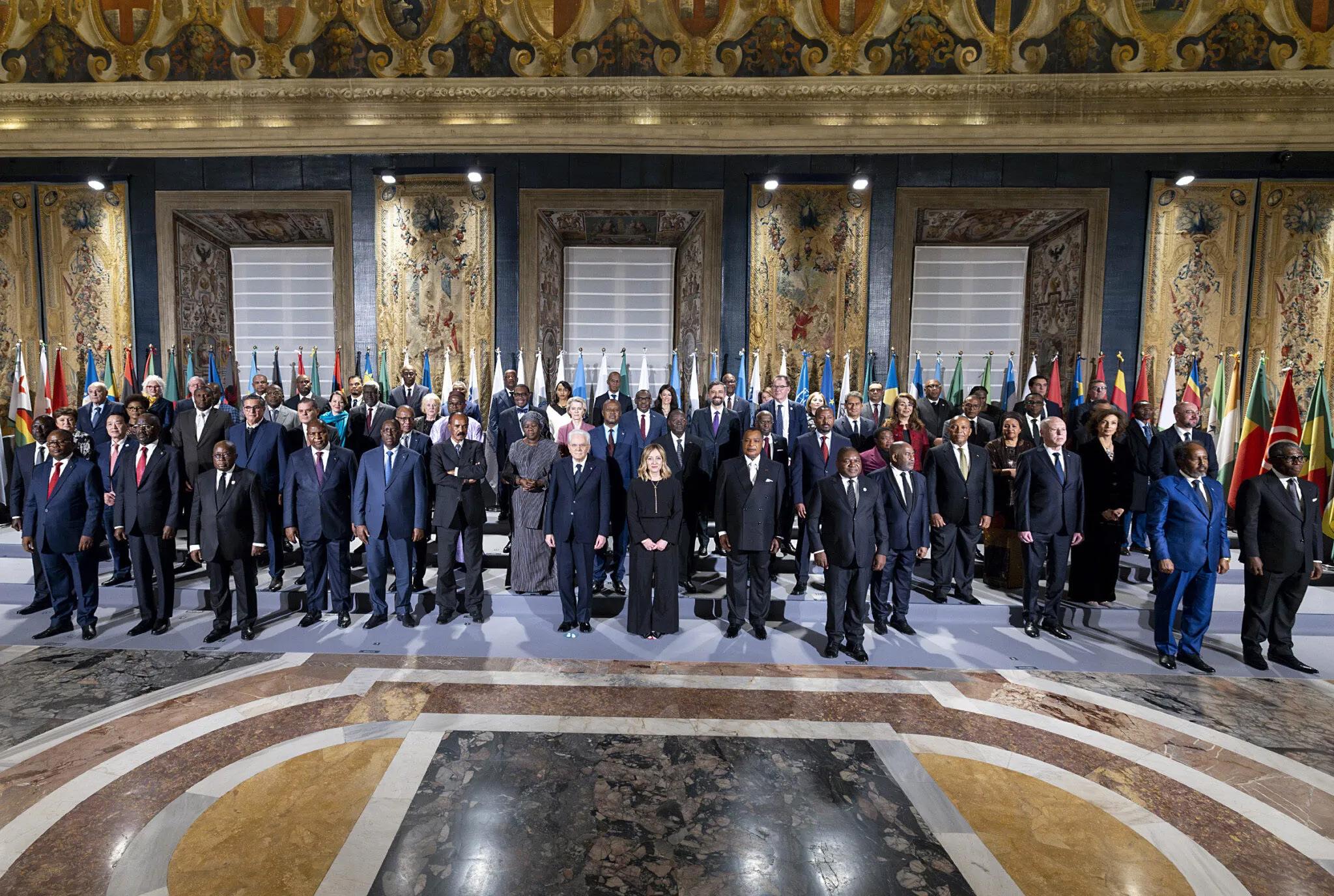
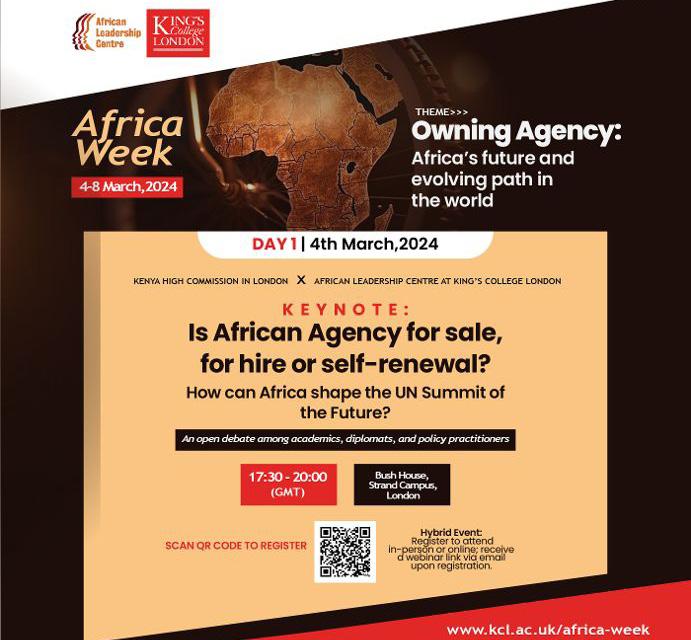
Regarding self-renewal, African agents acting autonomously for the benefit of their individual countries could constitute self-renewal. The recent case of Niger, and its rejection of France, demonstrates the breakdown of France’s influence over Nigerien sovereignty. Some will argue that this moment in Niger’s history could demonstrate a move towards self-renewal of its agency by prioritising self-governance over foreign influence from France.
But does this count as collective African agency even if it is a form of agency? And can the departure of the three countries from ECOWAS really bring renewal for the continent?
There are abundant opportunities in the current clime to reframe African agency towards self-renewal. One such opportunity is the forthcoming Summit of the Future and the UN Secretary-General’s A New Agenda for Peace. But it is doubtful, even if highly desirable, that African governments will seize the moment, because Africa must be able to demand the following as a minimum: a new form of peace intervention in Africa that replaces the hollow liberal peace agenda.
The experience of the past two decades suggests that the liberal peace approach only serves a limited utility as the sole
response to armed conflict in Africa. It has not guaranteed sustainable peace.
Africa, too, needs internal renewal to stem the falling tide of its regional institutions. Africa’s multilateral institutions must strive to have representatives elected by the people of Africa and not simply handpicked by their governments. There are modalities for this in a technologically rich environment.
African youth must have a collective voice in a future summit that ensures that their collective agency is asserted. In sum, the scene is not yet set for Africa’s collective agency. But it is never too late.
’Funmi Olonisakin is Professor of Security, Leadership and Development at the African Leadership Centre; and Vice-President (International Engagement and Service), King’s College London. The above is an abridged version of her Opening Keynote during King’s Africa Week 2024 from March 4-8.




The Nordic Africa Institute in Uppsala, Sweden; the University of Pretoria’s Centre for the Advancement of Scholarship in Pretoria, South Africa; and Trust Africa, Dakar, Senegal, jointly convened a research seminar entitled Beating African Swords into Ploughshares: From Military Security to Human Security on October 3 and November 2023 in Uppsala. Africa Briefing publishes excerpts from the policy brief
THE paradox of United Nations peacekeeping in Africa refers to the current reality in which, while African peacekeepers are more willing to undertake such missions, they often lack the capacity and resources to do so. UN peacekeepers deployed in Africa are much better resourced than regional peacekeepers, but often avoid dangerous enforcement missions to protect civilians due to the political risks entailed in such deployments.
This situation is exacerbated by the political interests of external actors like France, Russia, and the US in Africa.
Within this context, UN peacekeepers have faced credibility challenges as their first deployment to Africa failed to prevent the assassination of popular Congolese Prime Minister, Patrice Lumumba, in January 1961.
Since then, Burundi, Chad, Egypt, Eritrea and Sudan have all expelled UN peacekeepers from their territories, with Mali and the Democratic Republic of the Congo (DRC) being the latest in 2023 to demand that the UN withdraw its troops from their countries. This expulsion of UN peacekeepers could, however, worsen political instability across the Sahel, the Great Lakes, and the Horn of Africa.
More positively, UN peacekeeping in Africa has helped to restore peace and democratic rule to Namibia, Mozambique and Sierra Leone. African governments, however, doubt both the efficacy and intentions of external peacekeepers. The presence of French and American troops, as well as Russian-based Wagner mercenaries in countries such as Chad, Djibouti, Niger, Mali and the Central
African Republic (CAR) are often seen as more self-interested interventions rather than genuine efforts to strengthen Africa’s security architecture.
In order to strengthen the presence of the UN in Africa, the decision-making
role of the continent within the world body should be urgently enhanced. The 15-member UN Security Council – with primary responsibility for global peace and security – is inherently hierarchical, with a two-tiered system of membership,

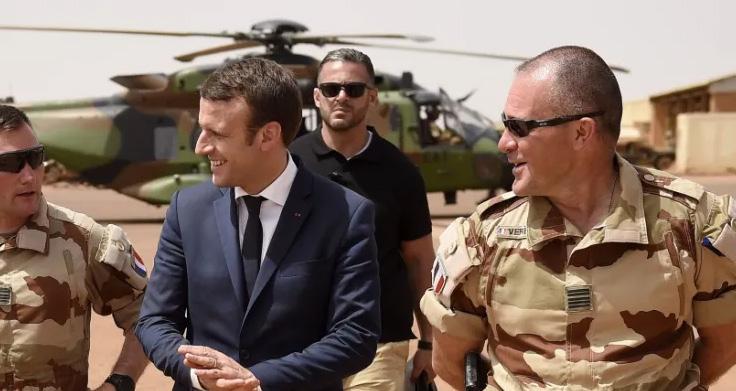

Willing African peacekeepers lack capacity and resources to undertake such missions ‘ ’
making it difficult for non-permanent members to influence major decisions. The Council consists of five veto-welding permanent members (P5) – the US, China, France, Russia and Britain – alongside 10 non-permanent members (E10), elected by the UN General Assembly for two-year terms.
This has created an institutional imbalance that often results in unequal representation, with the veto-wielding P5 often dominating decision-making. Africa has three rotating seats – the Africa Three (A3) – on the Council. Although 84 per cent of UN peacekeepers are deployed in Africa and 60 per cent of its deliberations typically focus on Africa, the continent is not adequately represented on the Council and lacks veto power.
Regardless, the A3 has increased coordination between the UN and the African Union, so that positions taken in Addis Ababa by the 15-member AU Peace and Security Council (PSC) are fed into the deliberations of the UN Security Council
in New York.
Article 4(h) of the Africa Union Constitutive Act of 2000 empowers the continental body to intervene militarily in cases involving war crimes, genocide, and crimes against humanity. The continental organisation is thus seeking to enhance its supranational powers, since decisions to intervene do not require prior authorisation from affected member states. Decisions on interventions are instead taken by the AU Peace and Security Council, following a two-thirds majority, in the absence of consensus.
Four factors have, however, often prevented this article from being efficiently employed. First, the AU Assembly of Heads of State and Government make the final decision on interventions, and is seldom united on decisions to intervene. For example, the AU Peace and Security Council’s recommended intervention into Burundi was rejected by the Assembly in January 2016.
Second, the AU has yet to establish
the 25,000-strong African Standby Force (ASF), a continental contingent that is expected to be deployed whenever Article 4(h) has been triggered. Third, other institutions such as the AU Commission, the Pan-African Parliament (PAP), and the African Court of Justice (ACJ) have not been active in the continental security architecture, and thus have little or no meaningful supranational powers. Fourth, the AU governance architecture has been unable to address fundamental rights violations and failed to build an effective early warning system.
Since the end of the Cold War, UN peace support operations now include other mandates – beyond military expertise – such as peacebuilding involving reintegrating combatants, strengthening the rule of law, improving respect for human rights, strengthening democratic institutions, and promoting justice and reconciliation. Civilian police in peacekeeping missions now perform nonmilitary protection tasks that militaries are often not trained to undertake.
In this regard, the UN civilian police authorised strength for peacekeeping operations grew from 1,677 in January 1994 to 7,545 in August 2023, demonstrating an increased demand for policing expertise in peace operations. In Africa, as of August 2023, there were 7,475 UN civilian police officers deployed to Abyei, the DRC, Mali, South Sudan, Western Sahara and CAR.
The Responsibility to Protect (R2P) concept promoted by the UN since
2005 is guided by three key pillars: the responsibility of states to protect their populations; the responsibility of international actors to encourage and support states in their protection responsibilities; and the responsibility of the international community to protect, if necessary, through collective action.
R2P aims to prevent mass atrocities such as war crimes, crimes against humanity, ethnic cleansing, and genocide. Many conflicts in Africa can be linked to increased fatalities in one-sided violence related to the direct and deliberate killings of civilians. These, however, represent a failure of R2P principles.
The need for proper understanding and implementation of R2P is increasingly apparent in Africa, since conflicts have become more durable and complex. This has created increased humanitarian crises in Sudan, South Sudan, CAR, Chad, the DRC, Somalia, Ethiopia, Mozambique, Burkina Faso, Cameroon, Mali, Niger and Nigeria.
In its peacebuilding efforts in Africa, the UN often prioritises international interventions and top-down approaches over locally-owned initiatives. These peacebuilding efforts have, however, failed to provide sustainable peace on the continent, with conflicts recurring after five years or less. Peace efforts in South Sudan and Somalia are examples of such “liberal peacebuilding”.
The top-down approaches in both states focused on building state institutions,

promoting security sector reform, and developing liberal market ideologies. Yet, both states remain active conflict zones.
“Decolonial peacebuilding”, in contrast, has resulted in some success in Somaliland where indigenous approaches have achieved some stability and development.
Former UN Secretary-General, Boutros Boutros-Ghali, in his 1992 An Agenda for Peace, defined mediation as part of peace-making, which involved actions to bring hostile parties to agreement through effective peacebuilding measures. The success or failure of mediation is thus based on three key factors: political will on the part of the conflicting parties (such as the April 2011 attempted and failed AU mediation in Libya); leverage by the mediator (such as the UN mediation efforts in Western Sahara in which a lack of leverage has so far failed to bring Morocco to the negotiation table); and third, a commitment by external actors (such as the current efforts of Saudi Arabia, the US, and other international actors in Sudan).
Despite a growing mediation gap, most successful mediation in Africa has been led by Africans. Only five of 15 successful conflict mediations – defined in terms of peace agreements reached – in Africa between 1989 and 2018, were led by nonAfricans.
The scourge of children in armed conflict across the continent has also attracted various international mitigation efforts. These initiatives have, however, failed to have a substantial impact on children in wars.
In 2022, the UN recorded grave violations affecting 18,890 children in armed conflicts globally. These violations involved killing, maiming, recruitment and abduction of children. Seven African states – CAR, the DRC, Libya, Mali, Somalia, South Sudan, and Sudan – were among the worst cases. The continent currently accounts for 40 per cent of the world’s 250,000 child soldiers.
Addressing the root causes of jihadism in Africa requires understanding the views of jihadists such as Boko Haram in Nigeria who often cite anger at local, national, and global policies and power structures. Structural factors such as poverty, underdevelopment and marginalisation are important root causes of jihadism in Africa.
This situation is exacerbated by the limited capacity of national security forces,
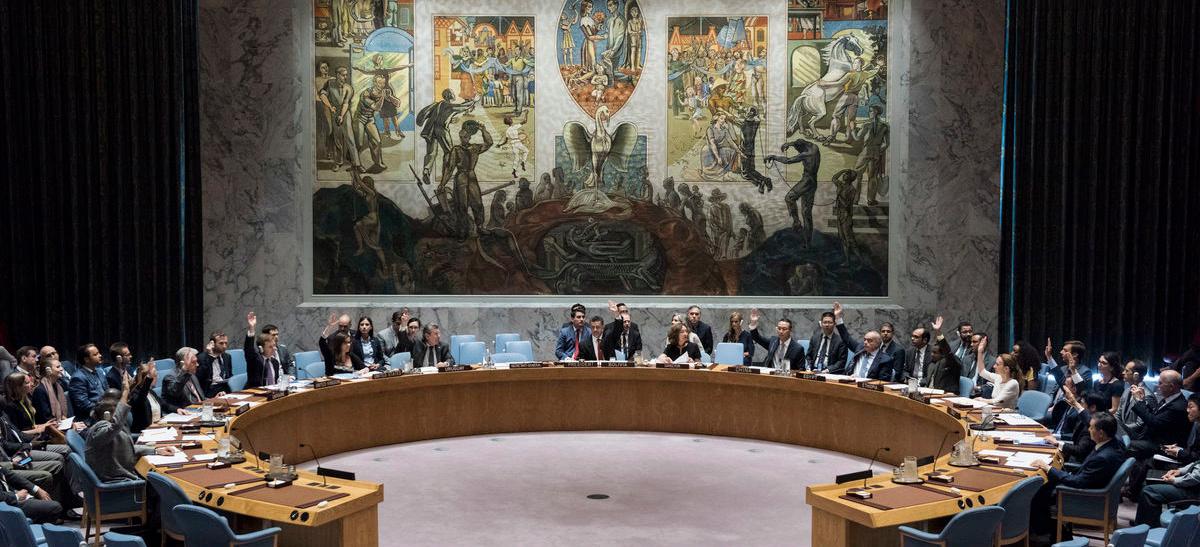
coupled with the excessive use of force by securocrats which has made it easier for jihadist networks to infiltrate local and vulnerable conflict-affected communities by spreading ideological appeal and strategic manipulation among marginalised populations.
Ten substantial policy recommendations emerged from the October/November 2023 Uppsala seminar:
• First, there is an urgent need to build bridges between the three key pillars of the international system – security, development, and human rights –especially since only 12 per cent of the UN’s Sustainable Development Goals (SDGs) have been achieved at its halfway point in 2023.
• Second, in order to mitigate the humanitarian crises in Africa, all international aid agencies, including the UN, Non-Governmental Organisations (NGOs) and donors must commit to working according to three fundamental principles: national systems should be reinforced and not replaced; crises should be anticipated and planned for instead of improvising in often chaotic conditions; and there must be effective cooperation between humanitarian workers and development actors.
• Third, research indicates that half of conflict cases tend to relapse into war within five years due to inadequate peacebuilding. This demonstrates the failure of the poorly funded UN
Peacebuilding Commission. There is therefore an urgent need for a better-resourced UN Peacebuilding Commission that can work closely with the Security Council.
• Fourth, the challenges facing the AU’s supranational right to intervene can be addressed by reassessing the decisionmaking process for activating its Article 4(h). Potentially effective approaches would include decisions by AU leaders being subject to a two-thirds majority rather than taken by consensus, with the AU Peace and Security Council being granted the authority to make the final decision on future interventions.
• Fifth, there is an urgent need to operationalise an effective 25,000-strong African Standby Force, supported by UN funding and logistics, in order to address the challenges of deploying financially and logistically deficient African peacekeepers.
• Sixth, consistent with the July 2023 A New Agenda for Peace of UN Secretary-General António Guterres, there is an urgent need for regional peace enforcers to be supported through UN-assessed funding. This will ensure that deployed peacekeepers are able to sustain themselves in the field.
• Seventh, UN troop-contributing countries must ensure that deployments are aimed specifically at restoring peace to conflict zones and protecting civilians in need, rather than pursuing
more parochial interests. Peacekeepers must thus be willing to take part in risky operations in Africa.
• Eighth, in order to address the inherently hierarchical decisionmaking process of the UN Security Council, an institutional mechanism to document, track, support and improve E10 membership should be created to serve as a secretariat for non-permanent members of the Council. Lessons learned can thus be more efficiently shared with present and future E10 members.
• Ninth, the current UN Security Council is a relic of the 1945 world and therefore not fit-for-purpose in the 21st century. As such, permanent membership of the Council should be expanded to include regional powers such as Nigeria, South Africa, Brazil and India.
• Finally, predominant approaches to mitigating the contemporary climate crises are those which sustain and extend existing political and economic structures. There is therefore an urgent need to promote climate justice in the crafting of climate policies using decolonial methods to address climate change-related issues. Indigenous mechanisms for peacebuilding and justice should thus be restored and implemented with the active participation of local communities.
Despite the continuous drive to Pan-Africanism, nationalism in some countries on the continent is in direct conflict with the African Union’s mandate for a united Africa, writes Shreya
DharmalingamMIGRATION is hardly a new concept in the international arena and has arisen historically for a number of reasons. The African continent has felt the effects of migration firstly through its shared colonial experience and the diaspora communities it created, as well as in a contemporary setting, through the rising migration of individuals who often seek economic opportunities, refuge, sanctuary and overall socio-economic stability.
Despite the galvanisation of PanAfricanism as a response to the colonial legacy, and the contemporary commitment to continental integration, xenophobia has risen in conjunction with migration. As the influx of immigrants grows, so too does the grip on national identity. This in turn promotes social exclusion, which is a characteristic of xenophobia. Nationalism is strongly linked to the idea of a “hierarchical world order” such that citizens of a nation tend to view their country as superior to others.
Given the declining access to economic opportunities and resources within many African nations, migration provides the opportunity to seek economic stability. Yet, these attributes, nationalism and the belief that immigrants benefit from the economic opportunities without contributing to the economy or welfare of that nation, have inspired xenophobia.
It must be recognised, however, that both state and citizen actions and attitudes have a part to play in the exacerbation of xenophobia. South Africa provides both a profound example of this as well as a central case study to understanding the ramifications of xenophobia on regionalism.
Modern regionalism, which developed from Pan-Africanism, has been the central
mandate of the African Union and has come to mean the “collective self-reliance or strategy for economic transformation and development framework”. Regionalism is important because it comes with significant economic and political benefits such as competitive growth and access to
world markets as well as sovereignty and strength in the global arena.
It seeks to address the power asymmetries that have remained after colonialism, which have contributed to stagnant or declining growth, human

insecurity, and inequality on the continent. South Africa is a key driver of regionalism given its top economic position in Africa.
Historically, this has made it a magnet for migration given the economic and political opportunity that it presents. However, the South African xenophobic attacks that have been rising in intensity and compounded by denialism and institutional policy have become a large obstacle to this.
South Africa has experienced ongoing and more intense periods of xenophobic attacks by nationals against immigrants since the 1994 move to democracy. This intensely hostile South African climate for immigrants undermines regionalism and South Africa’s leadership in enforcing integration.
Xenophobia worsens relations between African states which directly hinders the progress of regionalism. Moreover, these arguments bring about questions on
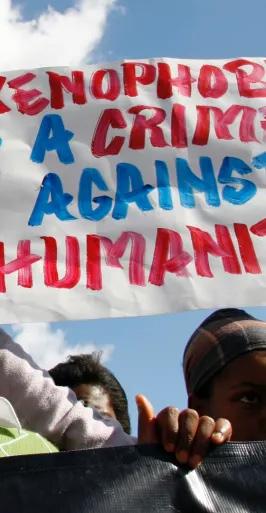
whether South Africa was fit to chair the African Continental Free Trade Agreement (AfCFTA) in 2020, given its mandate to foster intra-African trade which seeks to contribute to regional integration.
As such, one can see that South Africa has the potential to be the prominent leader in enacting regionalism, yet it is hindered by xenophobic sentiment which has undermined ties with its African partners. Therefore, in order for regionalism and its benefits to be reaped, South Africa has to engage in proactive domestic policy to disallow both indirect and direct discrimination based on ethnicity or nationality, so that an environment of cohesion is fostered.
Policy measures must be implemented with the overarching goal of ensuring that foreigners are seen as equal under the law so as to dispel anti-immigrant hostilities from both a governmental and societal level. This should be supported by efforts made to expose anti-immigrant attitudes and misinformation in the media, as well as
is therefore central to ensuring that antixenophobia policy and mindsets are created within a South African context to the benefit of the whole continent.
Thus, the proliferation of nationalism, a hierarchical world order and the belief that immigrants exploit the economic opportunities available within these nation states has resulted in the creation of “the other” compared to the citizen. The rise of migration has seen a parallel increase in xenophobia, or discriminatory attitudes and actions against foreign nationals in Africa.
Whilst there are various case studies which exhibit this within the continent, South Africa remains the most significant context for a number of reasons. The country exhibits both rising intensity and occasions of xenophobia which are compounded by state denialism and a lack of policy to propagate social cohesion.
This has a remarkable effect on the AU’s mandate for regionalism, which has the potential to provide economic
Both state and citizens play a part in the exacerbation of xenophobia ‘ ’
education campaigns about migrant activity and culture to encourage cohesion.
The first step to building such policy, however, is to recognise that xenophobia forms part of both human rights and security policy. As such, policy measures must be supported by a human rights commission at both a national and regional level.
The AU becomes an important platform through which this commission can be effective, as well as a means by which migration data and policy measures can be recorded and evaluated to ensure holistic social cohesion. Recognition of the significance of xenophobia and its effects on human security and well-being
and political advantages to the continent as a whole. South Africa, as a key driver of economic growth and voice of the continent, places the potential for regionalism at a risk owing to the xenophobia which destabilises ties with its African partners and limits the potential for joint growth.
Thus, South Africa has to realise its significant position as a leader in Africa and recognise the detriments of xenophobia on enforcing regionalism. Through active policy creation targeting indirect and direct forms of xenophobia, the benefits of sustainable development, sovereignty and competitiveness in the global arena can be reaped through regional integration.

In this comprehensive analysis by Jon Offei-Ansah, explores how Ghana and other African countries are spearheading efforts to add value to their mineral exports, propelling economic growth, and fostering sustainable development across the continent
IN recent years, African countries have increasingly recognised the importance of adding value to their mineral exports as a means to stimulate economic growth, create jobs, and foster sustainable development. Ghana, in particular, has been at the forefront of this movement, leveraging its rich mineral resources to propel itself towards becoming a hub for battery production. This analysis delves into the efforts of Ghana and other African nations to enhance the value of their mineral exports, exploring the opportunities, challenges, and implications of these endeavours.
Ghana, often referred to as the "Gold Coast," has a long history of mining and exporting gold. However, the country is also blessed with a diverse array of mineral resources, including lithium, manganese, bauxite, and diamonds, among others. Recognising the potential economic benefits of adding value to these minerals, Ghana has embarked on a journey to diversify its economy and enhance its industrial base.
One of the key initiatives driving Ghana's efforts in value addition is the development of its lithium mining and processing capabilities. In October 2023, the Ghanaian government granted licences for lithium mining in the southern township of Ewoyaa, signalling its commitment to tapping into this critical mineral. Subsequently, plans were unveiled for the construction of a lithium-refining facility in Tema, Ghana's largest port, by ReElement Technologies, a US-based subsidiary of American Resources Corporation.
The establishment of lithium mining and processing infrastructure represents a strategic move by Ghana to capitalise on the global demand for lithium-ion batteries, driven by the rapid expansion of electric vehicles and renewable energy technologies. By leveraging its abundant
lithium reserves, Ghana aims to position itself as a key player in the battery supply chain, offering significant opportunities for industrialisation, job creation, and technological advancement.
Furthermore, Ghana's ambitions extend beyond lithium, encompassing a wide range of minerals such as manganese, bauxite, and iron ore. The government has unveiled plans for joint venture projects to develop manganese and bauxite refining facilities, aimed at adding value to these raw materials and fostering downstream industries. Additionally, initiatives are underway to explore and assess the country's iron ore deposits, with the goal of establishing an integrated iron and steel industry.
Ghana's efforts to add value to its mineral exports reflect broader trends across the African continent. With Africa boasting significant reserves of critical minerals such as manganese, platinum, cobalt, and graphite, there is immense potential for value addition within the continent. Countries like Namibia, Zimbabwe, and Tanzania have implemented bans on raw
mineral exports, signalling a shift towards domestic refining capacity and value-added processing.
The rationale behind this shift is multifaceted. Firstly, there is a growing recognition of the need to diversify African economies away from overreliance on raw material exports. By adding value to mineral exports, countries can capture a larger share of the value chain, thereby increasing revenue, creating jobs, and fostering industrialisation. Moreover, domestic processing capacity reduces dependence on foreign markets and enhances economic resilience.
Secondly, there is a global trend towards securing critical mineral supply chains and reducing dependence on a few dominant players, notably China. As the world's largest consumer of critical minerals, China has historically held significant leverage over global supply chains. However, concerns over supply chain security, geopolitical risks, and environmental sustainability have prompted countries to seek alternative sources and diversify supply channels.
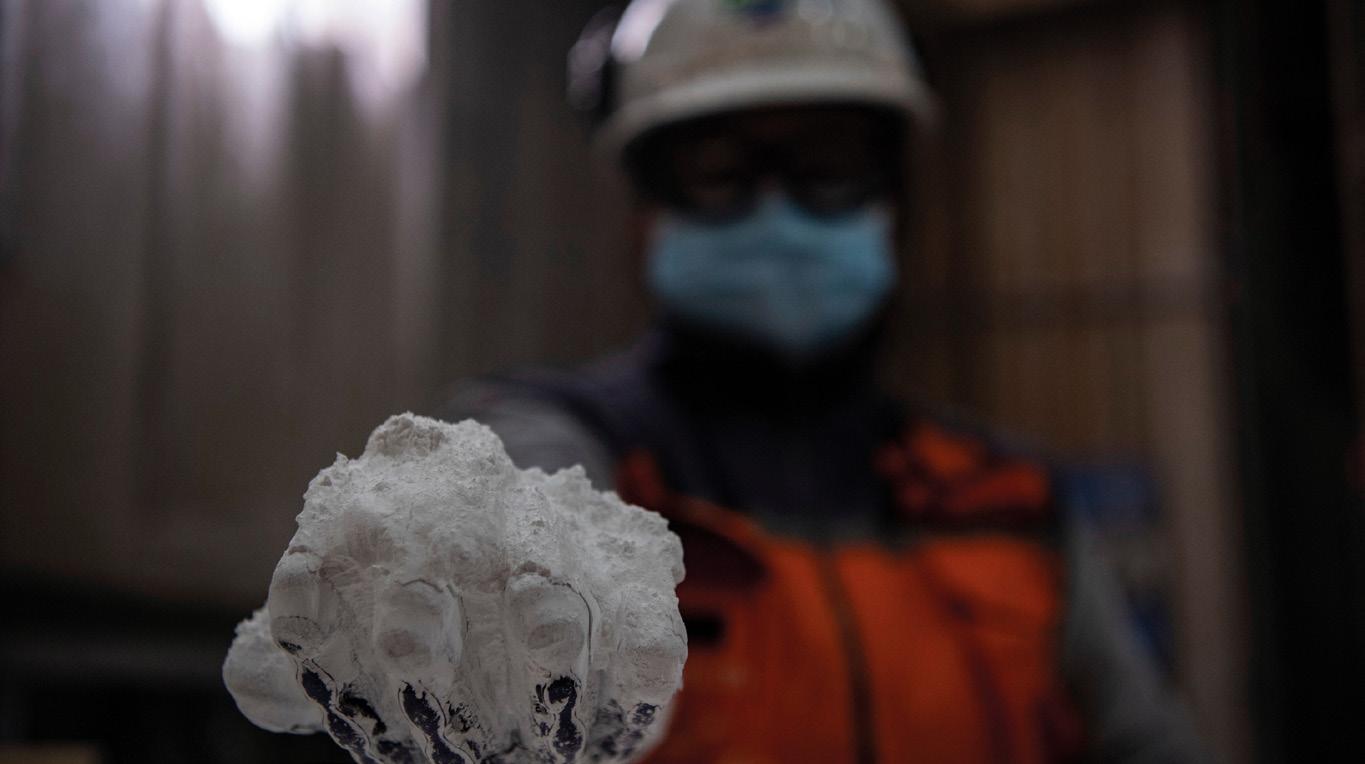

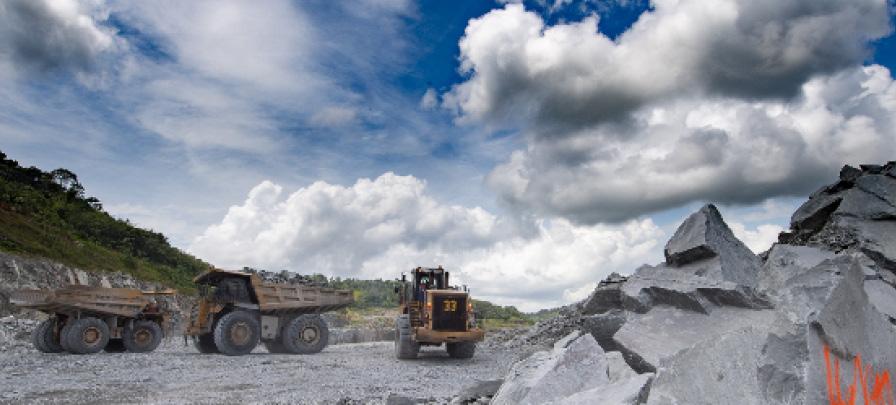
Africa's abundant mineral resources present an opportunity for the continent to emerge as a key player in the global critical minerals market. With approximately 85 percent of the world's manganese, 80 percent of its platinum and chromium, 47 percent of its cobalt, and significant reserves of other critical minerals, Africa possesses a competitive advantage in this sector. Moreover, the continent's relatively untapped reserves of lithium, graphite, and rare earth elements offer further opportunities for growth and development.
Despite the immense potential, African countries face a myriad of challenges in their quest to add value to mineral exports. These challenges range from inadequate infrastructure and limited technological capabilities to regulatory uncertainties and geopolitical risks. However, with the right policies, investments, and partnerships, these challenges can be overcome, unlocking the full potential of Africa's mineral wealth.
One of the primary challenges is the lack of adequate infrastructure to support mineral processing and beneficiation activities. Processing minerals such as lithium, manganese, and bauxite requires significant investments in energy, water, and transportation infrastructure. Moreover, the absence of specialised skills and technological expertise presents a barrier to establishing advanced processing facilities.
Furthermore, regulatory frameworks and governance structures play a critical role in shaping the investment climate
for mineral processing projects. Complex permitting processes, ambiguous legal frameworks, and inconsistent enforcement of regulations can deter investors and hinder the development of processing infrastructure. Therefore, creating an enabling regulatory environment is essential to attract investments and foster sustainable development.
Additionally, geopolitical risks and regional instability pose challenges to long-term investments in the mineral sector. Political instability, civil unrest, and regulatory changes can disrupt operations and undermine investor confidence. Therefore, ensuring political stability, strengthening governance institutions, and promoting regional cooperation are essential to mitigate risks and create a conducive investment environment.
Despite these challenges, African countries have significant opportunities to capitalise on their mineral resources and unlock economic value through value addition. By leveraging strategic partnerships with international investors and technology providers, countries can access the expertise and capital needed to develop processing infrastructure. Moreover, regional cooperation and integration can facilitate the pooling of resources and the establishment of regional processing hubs, promoting economies of scale and enhancing competitiveness.
The efforts of African countries to add value to their mineral exports have far-reaching implications for economic
development, industrialisation, and sustainable growth. By moving up the value chain and fostering downstream industries, countries can create jobs, generate revenue, and stimulate economic diversification. Moreover, value addition promotes technological innovation, skills development, and knowledge transfer, driving long-term competitiveness and resilience.
Furthermore, value addition contributes to sustainable development by promoting local beneficiation, resource stewardship, and environmental sustainability. By processing minerals domestically, countries can capture a larger share of the value chain and ensure that benefits accrue to local communities. Moreover, value addition encourages responsible mining practices, environmental protection, and social inclusion, aligning with the principles of sustainable development.
The efforts of African countries to add value to their mineral exports represent a paradigm shift towards economic diversification, industrialisation, and sustainable development. Ghana's initiatives in lithium mining and processing serve as a testament to the continent's potential to unlock economic value through strategic investments and partnerships. By overcoming challenges, seizing opportunities, and embracing sustainable practices, African countries can harness the full potential of their mineral wealth and pave the way for inclusive and resilient growth.
Developing the Lobito Corridor is more than an infrastructure project. In partnership with the US government, private sector engagement could unlock growth across three African countries and beyond, says Ellington Arnold
ON February 8, the Lobito Corridor Private Sector Investment Forum in Zambia concluded with great optimism. This gathering, hosted by the White House’s Partnership for Global Infrastructure and Investment (PGI) in collaboration with the Africa Finance Corporation, underscored the transformative potential of the Lobito Corridor rail project. It also positioned the project as a focal point for public-private partnerships with the potential to yield shared prosperity for Americans and Africans.
The Lobito Corridor project entails the construction of almost 350 miles of rail line in Zambia, along with hundreds of miles of feeder roads, linking the southern part of The Democratic Republic of the Congo (DRC) and the northwestern part of Zambia to regional and global markets via Angola’s Port of Lobito. It also includes the ongoing effort by the Lobito Atlantic Railway (LAR) to upgrade and operate the Benguela rail line (over 800 miles) that connects Angola to DRC, with AFC’s assistance. When completed, the project will expand an economic corridor connecting all three host countries to the world, potentially lower costs for business, and advance the shared vision of connected, open-access rail from the Atlantic Ocean to the Indian Ocean.
Linking the copper-rich mining region to the sea, the Lobito Corridor ushers in myriad new opportunities for economic growth and development that will unlock the region’s commercial competitiveness. This infrastructural investment is a powerful catalyst for the establishment of small businesses along the railway transport routes, fostering local economic growth. The corridor's impact will be far-reaching, touching sectors vital for the region and Africa overall: transportation & logistics, clean energy & critical mineral supply chains, and agribusiness.
The historic Lobito Corridor project is not just about constructing physical pathways; it is about creating a strategic commercial corridor transcending borders, benefiting local populations, and seamlessly integrating them into the global economy.
According to the African Development Bank, Africa requires up to $170 billion in annual investment to overhaul its infrastructure, with a significant portion earmarked for entirely new infrastructure and the remainder for maintenance. With 28 African countries having doubled their populations in the last 30 years
and amid predictions that 26 more African countries will double their populations in the coming 30 years, infrastructure investment in Africa is imperative. The world’s rising demand for natural resources and minerals underscores the necessity for port and rail infrastructure to facilitate the movement of commodities globally and fuel Africa's economic growth.
The Lobito Corridor project symbolises a commitment to fostering economic growth, enhancing connectivity, and promoting sustainable development in a resource-rich region that currently lacks the infrastructure necessary to realize its full potential.
The project takes a unique approach by leveraging global partners, such as the US and the EU, which have unified their efforts including through jointly initiating feasibility studies for a groundbreaking greenfield rail line expansion between Zambia and Angola. Collaborating with the Trans Africa Corridor, this project aims to link Angola, Zambia, and the DRC, with eventual connections to the Indian Ocean via Tanzania. The US government and the EU have also partnered with the African Development Bank and Africa Finance Corporation to inject over a billion dollars into Phase 1 of this visionary project.
This substantial investment has already catalysed impactful developments, including the upgrade of the Benguela railway, the facilitation of solar energy initiatives, and the expansion of 5G mobile access. Phase 2 will extend the corridor into Zambia, presenting abundant opportunities for businesses to invest in the country and the surrounding region. As the largest US infrastructure investment into Africa ever, the construction of the Lobito Corridor will unlock unprecedented investment opportunities
across core sectors like transportation, agriculture, energy, and digital infrastructure.
The Lobito Corridor Project offers unparalleled opportunities for US businesses. With a commitment to sustainability and green innovation, the private sector can be part of the corridor's transformative impact on Africa. Serving as a vital link for landlocked countries to access international markets, the Corridor project opens avenues for US businesses to establish partnerships, diversify supply chains, and contribute to the economic development and diversification of the region.
The US-Africa Business Centre (USAfBC) and our American Chambers of Commerce in partner nations are actively engaged in the development of the Corridor. On March 6 in Washington, DC, as part of the 2024 Powering Africa Summit, the USAfBC is organising an executive ministerial roundtable on the Corridor featuring key stakeholders from the US and African public and private sectors. This roundtable will focus on financing the energy transition to power the Lobito Corridor project and convene public and private sector leaders to explore sustainable energy solutions and financing opportunities for the corridor's development.
As the Lobito Corridor stands to become a transformative economic artery in Africa, businesses can and should engage in infrastructural development, capitalizing on the unprecedented collaboration between governments and the private sector. The corridor signifies a shift towards sustainable development and is a testament to the power of public-private partnerships in fuelling economic growth and prosperity.

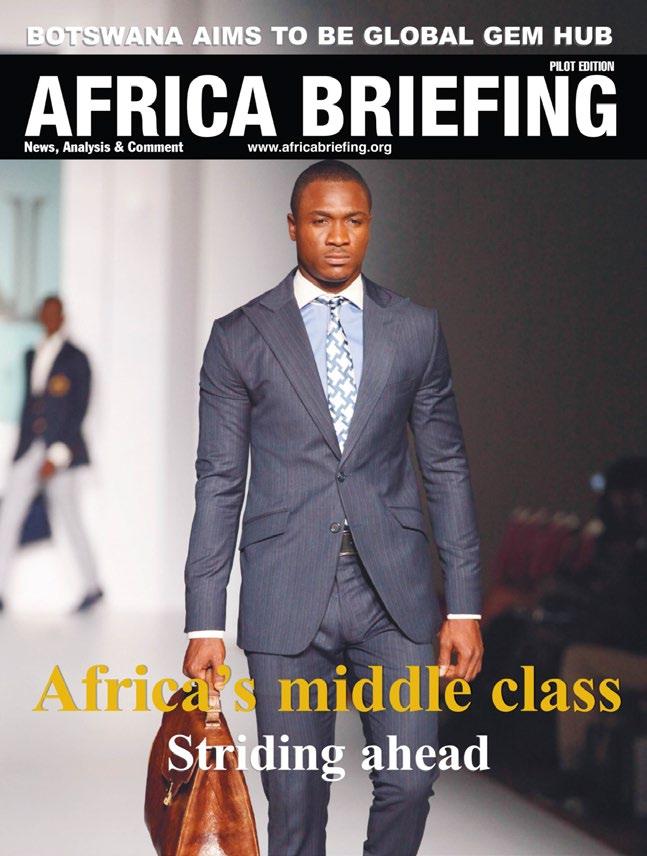
Testimonials from some of our online subscribers:
We wish to compliment the Africa Briefing Magazine for its insight and value added stories from the Last Frontier. From a Scandanavian view the quality of material presented on time gives us the edge for investment and business purposes. Keep up the good work. Jon Marius Hoensi MD Marex Group, Norway.
I write in conjunction with JIC Holdings and its CEO, Mark Anthony Johnson, to commend Africa Briefing on its coverage of the important political, economic and social news and events in Africa. Its coverage of a wide range of topics is very impressive. I look forward to future editions. David W Gouldman, Consultant, JIC Holdings, United Kingdom.
Africa Briefing is an interesting new project. The publication helps fill the gap in business and economyfocused African journalism. Africa Briefing combines a good news sense with crisp copy to the reader rapid immersion into what is important in economies across the continent. James Schneider, Editorial Director, New African Magazine, London, UK
Ojo Emmanuel Ademola looks at how AI and cybersecurity are reshaping entrepreneurship through associate website integration, and how businesses leverage AI for personalised experiences and cybersecurity for protection, driving growth in the digital era
IN today's fast-paced digital realm, the integration of associate websites into entrepreneurial ventures is no longer solely reliant on traditional tactics like marketing strategies and customer engagement. The landscape is evolving, with emerging technologies such as Artificial Intelligence (AI) and cybersecurity now playing pivotal roles in shaping the effectiveness and security of associate website integration. This article delves into how AI and cybersecurity are transforming entrepreneurship, backed by data and examples.
Enhanced visibility: Associate websites are powerful tools for increasing the visibility of knowledge-based enterprises. For instance, a consulting firm specialising in digital marketing can optimise its website for search engines, attracting more organic traffic and showcasing expertise through case studies and client testimonials. Similarly, a graphic design agency can leverage its associate website to display its portfolio and attract potential clients, while educational institutions can
promote courses and faculty expertise, attracting prospective students.
The significance of enhancing visibility through associate websites cannot be overstated. Consider a consulting firm specialising in digital marketing. By crafting an associate website rich with case studies, client testimonials, and industry insights, the firm not only enhances its online presence but also establishes credibility within its niche. Through search engine optimisation (SEO) techniques and strategic social media promotion, the firm can draw in a stream of organic traffic, ultimately leading to increased brand recognition and client inquiries.
HubSpot's study underscores the importance of consistent blogging, revealing that companies with active blogs generate 55 percent more website visitors than those without. This statistic further emphasises the pivotal role of valuable content creation in driving visibility through associate websites.
Moreover, the potential extends beyond consulting firms. Graphic design

agencies can showcase their portfolios and design processes, while educational institutions can highlight their courses and faculty expertise. Each entity, through strategic associate website integration, can effectively leverage online platforms to attract their target audience and establish authority within their respective industries.
Strategic networking through associate websites: Networking opportunities abound with associate websites. A software development company, for instance, can showcase partnerships with other tech firms, fostering credibility and attracting clients. Legal consultancies and healthcare startups can also leverage associate websites to highlight collaborations, building trust and attracting partners and investors.
The strategic utilisation of associate websites as networking tools presents an avenue for businesses to expand their reach and forge valuable partnerships. By prominently featuring collaborations and partnerships on their websites, businesses not only enhance their credibility but also demonstrate their commitment to collaboration and innovation.
Take, for example, a software development company looking to establish itself as a leading player in its industry. By showcasing partnerships with reputable tech firms and industry experts on its associate website, the company not only enhances its reputation but also positions itself as a trusted authority within the technology sector. This fosters trust among potential clients and partners, ultimately leading to increased opportunities for collaboration and business growth.
LinkedIn's survey findings further underscore the significance of online platforms for networking and lead generation, with 80 percent of B2B

leads originating from LinkedIn. This statistic highlights the immense potential of leveraging associate websites as networking tools to expand business reach and establish valuable connections within the industry.
Furthermore, legal consultancies and healthcare startups can leverage associate websites to showcase partnerships with law firms, medical institutions, and research organisations. By highlighting these collaborations, businesses not only demonstrate their expertise but also showcase their network and resources, thereby attracting clients, investors, and strategic partners.
Building thought leadership through associate websites: Knowledge-based enterprises can use their associate websites to share valuable insights, positioning themselves as thought leaders. Research institutes can publish whitepapers and reports, while sustainability consultancies can create resource hubs on environmental initiatives. Financial advisory firms can offer market insights, helping clients make informed decisions and building trust.
Building thought leadership through associate websites is instrumental in establishing businesses as authorities within their respective industries. By sharing valuable insights, research findings, and industry expertise, businesses can position themselves as trusted sources of information and guidance, ultimately enhancing their credibility and attracting clients.
Consider a research institute seeking to establish itself as a thought leader in a particular field. By publishing whitepapers, reports, and infographics on its associate
website, the institute not only showcases its expertise but also contributes valuable insights to the industry. This not only enhances the institute's reputation but also attracts clients, partners, and collaborators seeking specialised knowledge and expertise.
The Content Marketing Institute's study underscores the preference for informative articles over traditional advertisements, with 70 percent of consumers expressing a preference for getting to know a company via articles. This statistic highlights the importance of creating valuable and educational content on associate websites to engage and attract potential customers.
Moreover, sustainability consultancies can leverage their associate websites to create resource hubs on environmental initiatives, offering practical advice, guides, and case studies on sustainable practices. By providing valuable resources and insights, consultancies can position themselves as go-to experts in sustainability, attracting clients seeking sustainable solutions and guidance.
Similarly, financial advisory firms can offer market insights, investment strategies, and economic analyses on their associate websites, helping clients make informed financial decisions. By sharing timely and relevant content, firms can build trust with their audience and establish themselves as reliable sources of financial expertise.
Lead generation: Associate websites serve as potent lead generation tools. Training organisations can offer free webinars, capturing leads and nurturing them through targeted marketing campaigns. Marketing agencies can provide downloadable e-books, coaching
firms can create quizzes, and legal firms can host webinars on legal matters, all capturing leads effectively and nurturing client relationships.
Lead generation through associate websites is a strategic approach to capturing and nurturing potential clients. By offering valuable resources and interactive content, businesses can attract qualified leads and guide them through the sales funnel, ultimately driving conversions and revenue growth.
Consider a training organisation offering professional development webinars on its associate website. By promoting these webinars and collecting attendee information, the organisation can capture leads and follow up with targeted marketing campaigns to convert leads into paying customers. This not only generates revenue but also establishes the organisation as a trusted provider of educational resources and expertise.
Marketo's study underscores the importance of a strong lead generation strategy, revealing that companies with effective lead generation strategies generate 50 percent more sales-ready leads at a 33 percent lower cost. This statistic highlights the significance of leveraging associate websites as lead generation tools to drive business growth and success.
Furthermore, marketing agencies can offer downloadable e-books, coaching firms can create quizzes, and legal firms can host webinars on legal matters, all capturing leads effectively and nurturing client relationships. By providing valuable resources and interactive content, businesses can attract potential clients and guide them through the sales process, ultimately driving revenue growth and business success.
Expanding entrepreneurship with AI and cybersecurity integration
Artificial Intelligence (AI): AI revolutionises associate website integration by personalising user experiences, automating processes, and analysing data to optimise marketing strategies. It enables businesses to understand user behaviour, deliver tailored content, and provide realtime support through chatbots, driving engagement and increasing conversions.
Artificial Intelligence (AI) is revolutionising the way businesses approach associate website integration,
offering advanced capabilities to analyse data, automate processes, and personalize user experiences. Machine learning algorithms can analyse vast amounts of data to identify patterns and trends, allowing businesses to deliver targeted content, recommend products, and enhance customer engagement on associate websites.
The integration of Artificial Intelligence (AI) into associate websites has shown significant benefits for knowledgebased enterprises in optimising their online presence and enhancing customer experiences. AI-powered data analytics tools enable businesses to extract valuable insights from website interactions, user engagement, and conversion metrics. Through AI algorithms, businesses can generate reports on key performance indicators, user preferences, and content effectiveness, helping them make datadriven decisions to improve website performance and meet customer needs more effectively.
Furthermore, AI-driven personalisation features on associate websites enable businesses to create tailored experiences for individual users based on their preferences, browsing history, and behaviour patterns. By analysing user data in real time, businesses can deliver customized product recommendations, content suggestions, and targeted promotional offers to enhance user engagement and drive conversions. This personalised approach not only improves user satisfaction but also increases the likelihood of repeat purchases and customer loyalty.
In addition, AI-powered chatbots have become valuable assets for providing immediate and efficient customer support on associate websites. These virtual assistants use natural language processing
and machine learning algorithms to understand user queries, provide relevant information, and resolve customer issues in real time. By offering round-the-clock assistance, chatbots improve customer satisfaction, reduce response times, and alleviate the burden on customer service teams, ultimately enhancing the overall user experience on the website.
According to research by Adobe, businesses that leverage AI for personalisation and website optimisation experience a 30 percent increase in conversion rates and a 20 percent increase in customer satisfaction. This data underscores the significant impact of AI technology in driving performance and engagement on associate websites for knowledge-based enterprises. By harnessing the power of AI to analyse data, automate processes, and deliver personalised experiences, businesses can stay competitive in the digital landscape and provide valuable interactions that meet the evolving needs of their customers.
Cybersecurity: Cybersecurity plays a critical role in the integration of associate websites, as businesses must safeguard sensitive data and protect against cyber threats. With the increasing frequency and sophistication of cyber attacks, businesses need to prioritise cybersecurity measures to ensure the security and integrity of their associated website integration processes. Implementing encryption, secure authentication methods, and regular security audits can help businesses identify vulnerabilities, mitigate risks, and prevent data breaches. By enhancing cybersecurity protocols, businesses can build trust with customers, comply with data protection regulations, and mitigate financial and reputational risks associated with cyber threats.

The escalating threat of cyber attacks underscores the significance of robust cybersecurity measures in the integration of associate websites for knowledge-based enterprises. As organisations leverage associated websites for disseminating information, generating leads, and facilitating engagement with customers and prospects, they become potential targets for malicious activities seeking to compromise sensitive data and disrupt their operations. According to the Verizon Data Breach Investigations Report, 58 percent of cyber attacks target small businesses, highlighting the importance of implementing robust cybersecurity protocols to safeguard against unauthorised access, data breaches, and other cyber threats.
Incorporating encryption protocols, such as Secure Sockets Layer (SSL) and Transport Layer Security (TLS), into the associate website infrastructure can help encrypt data transmissions and protect sensitive information exchanged between users and the website servers. Secure authentication methods, such as multifactor authentication (MFA) and biometric verification, add a layer of security to prevent unauthorised access to user accounts and sensitive data.
Regular security audits and vulnerability assessments are essential for identifying potential security weaknesses, misconfigurations, and software vulnerabilities that could be exploited by cyber attackers. By conducting routine security assessments and implementing timely remediation measures, businesses can proactively address security gaps and enhance the resilience of their associate website integration to cyber threats.
Furthermore, compliance with data protection regulations, such as the General Data Protection Regulation (GDPR) and the California Consumer Privacy Act (CCPA), is crucial for ensuring the lawful handling of user data and maintaining trust with customers. Non-compliance with data privacy regulations can result in severe financial penalties, reputation damage, and loss of customer trust, underscoring the importance of prioritising cybersecurity and data protection measures in the integration of associate websites.
According to Cybersecurity Ventures, cybercrime is projected to cost the global economy $6 trillion annually by 2021, emphasising the significant financial impact of cyber attacks on businesses. By investing in cybersecurity measures, knowledgebased enterprises can mitigate risks, protect their valuable assets, and maintain the trust
and confidence of their customers in the digital realm. Prioritising cybersecurity in the integration of associate websites is essential for safeguarding sensitive data, preserving business continuity, and upholding a strong reputation in the face of evolving cyber threats.
Opportunities and challenges: The integration of AI and cybersecurity into associate website integration presents both opportunities and challenges for businesses. On one hand, AI technologies offer innovative solutions to optimise user experiences, drive conversions, and enhance marketing strategies on associate websites. Businesses can leverage AI to gain a competitive edge, increase operational efficiency, and improve scalability in their online operations. However, integrating AI technologies also comes with challenges, such as data privacy concerns, ethical considerations, and the need for specialised expertise to deploy and manage AI systems effectively.
The integration of AI and cybersecurity into associate website integration presents a dual-edged sword for businesses, as these technologies bring opportunities for innovation and growth, as well as challenges that require careful navigation and management. AI technologies have shown significant potential in revolutionising the digital landscape, enabling businesses to automate processes, personalise user experiences, and drive efficiencies in their online operations. According to Statista, the global AI market is expected to reach $126 billion by 2025, underscoring the growing adoption and investment in AI technologies across industries.
Businesses can leverage AI in associate website integration to analyse user data, predict customer preferences, and deliver personalised content and recommendations, thereby enhancing engagement, increasing conversions, and fostering brand loyalty. AI-powered chatbots and virtual assistants can provide real-time customer support, automate responses to user queries, and streamline communication channels, thereby improving customer satisfaction and retention rates.
However, the integration of AI technologies into associate websites also poses challenges that businesses need to address proactively. Data privacy concerns surrounding the collection, storage, and processing of user data remain a critical issue, as businesses need to ensure compliance with data protection regulations and safeguard

sensitive information from unauthorized access or misuse. According to a report by Gemalto, data breaches exposed over 36 billion records in the first half of 2020, highlighting the persistent threat posed by cyber-attacks and security breaches to businesses and their customers.
Ethical considerations surrounding AI adoption, such as algorithmic bias, transparency, and accountability, also present challenges that businesses must navigate to build trust, maintain transparency, and uphold ethical standards in their AI-driven operations. Deploying and managing AI systems require specialised expertise, training, and resources to ensure that AI technologies are effectively integrated, optimised, and monitored to deliver the desired outcomes while mitigating risks and addressing potential vulnerabilities.
Essentially, the integration of AI and cybersecurity into associate website integration offers immense possibilities for businesses to innovate, optimise operations, and drive growth in the digital era. By leveraging AI technologies responsibly, addressing data privacy concerns, and upholding ethical standards, businesses can harness the power of AI to enhance user experiences, strengthen cybersecurity defences, and achieve sustainable success in the digital marketplace.
Similarly, cybersecurity poses challenges for businesses looking to secure their associate website integration processes. With the evolving threat landscape and regulatory requirements, businesses need to invest in cybersecurity technologies, training, and practices to protect against cyber threats and ensure compliance with data protection regulations. Balancing the opportunities and challenges of integrating AI and
cybersecurity into associate website integration requires businesses to develop a strategic approach that prioritises data security, user privacy, and regulatory compliance while leveraging AI technologies to drive innovation and growth in the digital marketplace.
Cybersecurity continues to be a top priority for businesses as they navigate the complexities of the digital landscape and seek to protect their assets, customers, and reputation from cyber threats. By adopting a proactive and holistic approach to cybersecurity, businesses can mitigate risks, build resilience, and maintain trust with their stakeholders in an increasingly interconnected and data-driven world. From implementing robust cybersecurity measures to embracing AI-driven solutions, businesses can enhance their cybersecurity posture and adapt to the evolving threat landscape to achieve sustainable success in the digital age.
The convergence of AI, cybersecurity, and associate website integration presents both opportunities and challenges for businesses seeking to thrive in the digital era. By leveraging AI technologies to personalise user experiences, automate processes, and optimise marketing strategies, businesses can enhance engagement, drive conversions, and foster brand loyalty on associate websites.
However, addressing data privacy concerns, ethical considerations, and cybersecurity risks is essential to build trust, maintain compliance, and protect sensitive information in the digital realm. Through strategic planning, investment in technology, and commitment to best practices, businesses can maximise the benefits of AI and cybersecurity integration to achieve sustainable success and resilience in an increasingly competitive and dynamic
In
IN today's increasingly interconnected and digital world, nations face unprecedented economic challenges, with high inflation rates posing significant threats to stability and growth. In response, governments are turning to cutting-edge technologies such as artificial intelligence (AI) and cybersecurity to bolster economic resilience and mitigate the impact of inflationary pressures.
This article explores how leveraging AI and cybersecurity can empower governments to make informed policy decisions, protect critical infrastructure, and drive sustainable growth amidst inflationary pressures. Additionally, it emphasises the pivotal role of citizen responsibility in curbing high inflation through informed consumption, financial prudence, and adherence to regulations.
High inflation rates, such as the staggering 31.7 percent experienced in the Nigerian economy, present multifaceted challenges that require proactive and strategic responses. Inflation erodes purchasing power, disrupts business operations, increases borrowing costs, and undermines consumer confidence, ultimately threatening economic stability and social welfare. To effectively navigate these challenges, it is crucial to understand the underlying causes of inflation, which may include factors such as increased food prices, currency depreciation, supply chain disruptions, and excessive government spending.
In facing the challenges presented by high inflation, governments must leverage technological advancements such as AI and cybersecurity to monitor and manage economic processes effectively. AI offers unprecedented capabilities in economic forecasting, data analysis, and decisionmaking, enabling policymakers to gain valuable insights into inflation trends, identify emerging risks, and formulate
targeted policy responses. Moreover, cybersecurity measures are essential for safeguarding critical infrastructure, financial systems, and sensitive data from cyber threats that could exacerbate economic vulnerabilities.
To mitigate the impact of high inflation and foster economic stability, governments and individuals alike can adopt various strategies:
1. Understanding causes of inflation: Analysing factors contributing to inflation, such as supply chain disruptions and currency depreciation, is essential for devising effective policy responses.
2. Budgeting and financial planning: Creating a budget, cutting unnecessary expenses, and prioritizing essential items can help individuals cope with rising prices and manage their finances effectively.
3. Diversifying income sources: mitigating the impact of inflation by diversifying income streams ensures financial stability and resilience in the face of economic uncertainties.
4. Investing wisely: Exploring investment opportunities such as real estate, commodities, or stocks can help protect wealth against inflationary pressures and preserve purchasing power over time.
5. Seeking financial assistance: Individuals struggling to make ends meet during periods of high inflation can seek support from charitable organisations, government programmes, or community support networks.
6. Staying informed: Keeping abreast of economic developments, policy changes, and market trends is crucial for adjusting financial strategies and making informed decisions in response to inflationary pressures.
7. Seeking professional advice: Consulting with financial advisors or economists can provide individuals with personalised guidance and tailored strategies for navigating high inflation effectively.
Examining Nigeria's historical experiences with inflation provides valuable insights into recurring trends, policy


responses, and potential strategies for addressing current challenges. Historical periods of high inflation, driven by factors such as excessive government spending, currency devaluation, and political instability, offer valuable lessons for policymakers and individuals alike. By understanding the root causes and historical context of inflation in Nigeria, stakeholders can develop more informed and nuanced approaches to mitigating its impact and promoting economic stability.
Governments play a crucial role in addressing high inflation through a combination of monetary policy adjustments, fiscal measures, structural reforms, and international collaboration. By implementing targeted policies to manage the money supply, control inflationary pressures, and promote price stability, governments can mitigate the adverse effects of inflation on businesses, consumers, and the overall economy. Moreover, collaboration with international financial organisations such as the International Monetary Fund (IMF) and the World Bank can provide governments with valuable expertise, resources, and best practices for managing inflation and restoring economic stability.
While governments play a central role in addressing high inflation, citizens also have a crucial role to play in promoting economic stability and resilience. Through responsible consumption, support for local producers, advocacy for good governance, financial literacy promotion, and engagement in dialogue and advocacy, citizens can contribute to mitigating the impact of inflation and fostering sustainable growth. By actively participating in community initiatives, engaging with
policymakers, and promoting collective action, citizens can help shape policies that support economic stability and benefit society as a whole.
Emerging technologies such as AI and cybersecurity offer unprecedented opportunities to enhance economic resilience, optimise decision-making processes, and mitigate the impact of inflationary pressures. AI applications can improve economic forecasting accuracy, streamline government processes, and optimise resource allocation, enabling governments to make data-driven policy decisions and respond effectively to inflationary trends. Moreover, cybersecurity measures are essential for safeguarding critical infrastructure, financial systems, and sensitive data from cyber threats that could undermine economic stability and exacerbate inflationary pressures.
Countries around the world are increasingly leveraging AI and cybersecurity technologies to navigate high inflation and economic challenges effectively. Examples include:
1. United States: The US government has been investing in AI research and development to improve economic forecasting, optimise policy decisions, and enhance cybersecurity capabilities. Agencies such as the Department of Defence and the Department of Homeland Security have deployed AIpowered tools to detect and respond to cybersecurity threats, safeguard critical infrastructure, and combat inflationary pressures.
2. Singapore: Singapore has developed a national AI strategy to harness the potential of AI for economic growth,
innovation, and social development. The government has partnered with industry stakeholders to promote AI adoption in various sectors, including finance, healthcare, and transportation, to enhance productivity, efficiency, and resilience in the face of economic challenges such as inflation.
3. Israel: Israel is known for its strong cybersecurity capabilities and has established itself as a global leader in cybersecurity innovation. The Israeli government has invested in cybersecurity research, education, and industry partnerships to address emerging cyber threats, protect critical infrastructure, and enhance economic resilience in a high-inflation environment.
4. Estonia: Estonia has embraced digital transformation and e-governance to streamline government services, promote economic growth, and enhance cybersecurity resilience. The government has implemented digital identity solutions, secure digital payment systems, and advanced cybersecurity measures to protect against cyber threats and ensure economic stability amid inflationary pressures.
These examples demonstrate how countries around the world are leveraging AI and cybersecurity technologies to navigate high inflation and economic challenges effectively. By investing in technology-driven solutions, governments can enhance their economic resilience, mitigate risks, and promote sustainable growth in the face of complex economic conditions.
Navigating high inflation requires a multifaceted approach that leverages AI, cybersecurity, and citizen responsibility to promote economic stability and resilience. By harnessing the power of technology, governments can make informed policy decisions, protect critical infrastructure, and drive sustainable growth amidst inflationary pressures. Moreover, citizen engagement and responsible behaviour are essential for promoting economic stability, fostering inclusive growth, and ensuring the well-being of society as a whole. As countries continue to grapple with high inflation and economic challenges, strategic investments in AI, cybersecurity, and citizen empowerment will be crucial for building a more resilient and prosperous future.
Valerie Msoka highlights the imperative of investing in women and advancing gender equality in Africa, focusing on key areas such as education, gender-based violence and women's participation, and argues that collective action can unleash Africa's boundless potential for a more prosperous and inclusive future
AS the world celebrates International Women's Day (IWD) in March, it is also right to remind ourselves that it isn't just another date on the calendar but a call for celebrating women's achievements, advocating for gender equality, and pushing towards a more inclusive society. In a continent mired with customs, traditions, patriarchy, social-inflicted inequalities and conflicts that push women to the background, this annual celebration is vital as the women of the continent push, fight and shout for gender equality as a necessary and much needed ingredient for sustainable development.
According to the UN Women, this year’s IWD theme, Invest in Women: Accelerate Progress, is a call for a joint action to ensure women are not left behind by ensuring women’s and girl’s rights across all aspects of life to secure prosperous and just economies, and a healthy planet for future generations. In essence a life where gender equality is the norm.
For Africa, the theme is a rallying call because while a powerful transformation is underway across its diverse landscapes as women rise to claim their rightful roles as catalysts for progress, yet entrenched systemic barriers and deep-rooted gender disparities continue to hold them back. Women face a multitude of challenges, from limited access to education, health care, unequal opportunities to harmful traditional practices that curtail girls’ chances of reaching their potential as fully grown women.
It is for this reason that Dr Amina Ali, a leading advocate for women's rights in Kenya says, “Investing in women means more than just providing financial support; it's about dismantling barriers, challenging stereotypes, and creating environments where women can flourish and contribute meaningfully.”
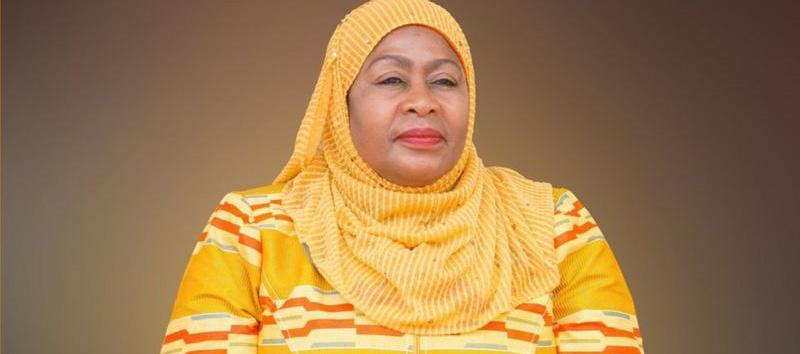
Below are just three areas where this needs to be done.
Education lies at the heart of empowering African women. It impacts every aspect in the fight for gender equality as it empowers students to recognise and challenge gender biases, ensuring everyone’s voice is heard, thus preventing discrimination and inequality. But, according to recent statistics from UNESCO, sub-Saharan Africa has the world’s highest rates of out of school children, including more than one in five 6–11-year-olds and almost three in five 15 –17-year-olds.
UNESCO notes that while there has been progress towards addressing challenges to education, more is needed to address the millions of girls in Africa who still lack quality education due to poverty, GBV including child marriage, cultural norms which favour boys, and inadequate infrastructure.
“Educated girls marry later, have fewer children, and actively participate in the workforce, driving economic growth and prosperity. Investing in girls' education is not just a moral imperative; it's an
economic necessity.” states Dr Fatoumata Diop, an education specialist at the African Development Bank.
Recognising that education is core to Africa’s progress, UNICEF supports governments to ensure that budgets are gender responsive, and for national education plans and policies to prioritise gender equality. “Girls’ education transforms communities, countries, and the entire world. This is because girls’ education strengthens economies and reduces inequality. It contributes to more stable, resilient societies that give all individuals – including boys and men – the opportunity to fulfil their potential,” says UNICEF.
According to the UN, in Eastern and Southern Africa, 42 percent of women experience physical or sexual violence in their lifetimes. The impact extends far beyond individual survivors, with implications for the productivity and wellbeing of families and communities, often across generations.
Some of the contributing factors that lead to GBV include poverty where food scarcity can increase incidents, war and
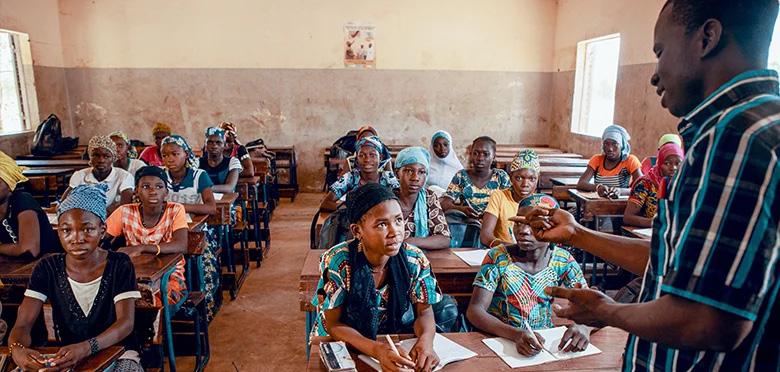
conflict which sometimes leads to harmful gender norms and perpetuate violence and practices such as child marriage and Female Genital Mutilation (FGM). Child marriage is a widespread practice in Africa, especially in sub-Saharan Africa, where statistics show that every four in 10 girls are married before the age of 18. Child marriage often leads to school dropout, early pregnancy, and physical and health risks.
In terms of FGM, Equality Now estimates that 55 million girls under the age of 15 in 28 African countries have experienced or are at risk of experiencing FGM, which remains prevalent in parts of West, East, Central, and Northern Africa. This, even though 28 African countries have specific anti-FGM laws or legal provisions. FGM can cause serious harm, including constant pain and during intercourse, infections, fistula, and depression to name a few.
A woman’s right to live free from violence is upheld by international agreements such as the Convention on the Elimination of all forms of Violence and Discrimination against women (CEDAW) and the 1993 UN Declaration on the Elimination of violence against women. With these agreements for guidance there are different approaches recommended by various bodies. These include strengthened and implemented national laws and policies to prevent GBV in all areas, promotion of favourable social norms to prevent GBV and promote women’s social and economic empowerment. Addressing GBV is cross cutting and includes access to health, policy dialogue, gender sensitive research, monitoring and evaluating health policies and programmes and intercountry collaboration.
“Improving access to healthcare services and addressing social determinants like poverty and gender-based violence are crucial,” says Dr Matshidiso Moeti, WHO Regional Director for Africa.
Women’s participation in all spheres is key to inclusive governance.
With the current conflicts occurring in Africa, UN Women points to the centrality of women as caretakers of families and also as advocates for peace, as peacekeepers, relief workers ad mediators. “If they are not offered a place at the negotiating table, women cannot raise issues arising from conflict that affect them in distinct and significant way,” states a 2019 policy brief on women in international security.
In terms of women’s participation is in the financial sphere, statistics show that enhancing women’s participation in development is essential not only in achieving social justice such as reducing inequalities, better health, and educationbut also in reducing poverty.
African countries need to adopt and implement regional and national plans, legislations, policies, strategies, budgets, and justice mechanisms to ensure that women are included and participate in the development sector as well as full access to the range of credit, banking and financial services and facilities for them to development their assets, land and businesses.
“Investing in women's economic participation not only promotes gender equality but also fuels economic growth and reduces poverty,” emphasises Dr Ngozi Okonjo-Iweala, Director-General of the World Trade Organisation. “When women thrive, economies thrive.”
On the political front, we have some positives in the case of Presidents Samia Suluhu Hassan of Tanzania and SahleWork Zewde of Ethiopia. Rwanda leads both globally and on the African continent in women’s political representation with more than 60 percent of parliamentary seats and 50 percent of ministerial posts being held by women. But despite this progress, women are underrepresented in political leadership roles across Africa. The Inter-
Parliamentary Union shows that, only 24.7 percent of parliamentary seats in Africa are held by women, below the global average of 25.5 percent. This means, “African countries are still far from achieving women’s equal and effective participation in political decision-making,” points out the 2021 Africa Barometer on Women’s political participation.
“Investing in initiatives promoting women's participation in politics ensures their voices are heard and their rights are protected,” states Dr Joyce Banda, former President of Malawi, adding, “We need more women in decision-making positions to drive the agenda for gender equality and women's empowerment.”
There is no doubt that change takes time, especially in the African continent where culture, tradition and the patriarchal system subordinate and discriminate women. This year’s IWD theme of investing in women and advancing gender equality highlights what Tanzania’s President Samia Suluhu Hassan said at the76th UNGA in September 2021, “As a female president, I know the burden to deliver on gender equality is huge. I also know being passionate about gender equality alone is not enough. My government is reviewing policies and laws to come up with plans for women’s economic advancement and attaining other aspects of gender equality and parity.”
Being passionate about gender equality alone is indeed not enough, nor too is having a high number of women parliamentarians or ministers. There should also be effective laws and policies, implementation mechanisms that can be monitored and evaluated, legal guarantees to ensure equity, protection, and action as well as genuine commitment from the leadership. CSOs should work to encourage women to assertively vie for positions so they bring the needed change. And transformation of behavioural attitudes that perpetuate gender inequality as well as the elimination of prohibitive and discriminatory cultures and traditions.
As we celebrate IWD 2024 the African proverb, “If you want to go fast go alone, if you want to FAR go together,” holds true for Africa. Together – governments, the AU, the UN, NGOs, CSOs, You and Ithrough dismantling barriers and fostering opportunities, we can unleash Africa's boundless potential and forge a more prosperous future for everyone. Together, we can catalyse Africa's journey towards progress by creating societies that are conducive for women’s full participation in all aspects of life – social, political, and economic.

The deliberate killing of women in the Kenyan context is a deeply-rooted societal issue that intersects with geographical location, class, age and sexual orientation, argues Merceline Odhiambo
SHARON Otieno was 26 years old and pregnant when she was killed in September 2018. She was a university student who was romantically involved with former Migori County Governor Okoth Obado who remains the prime suspect in her murder case.
There was controversy surrounding Otieno’s murder. Some said it was justified because she was having a relationship with someone above her social class and who was also married. Five years on, there is still no justice for her.
In April 2022, Sheila Lumumba, a nonbinary lesbian, was murdered, triggering the LGBTQI community into action because, according to the post-mortem, Lumumba was raped before she was killed. The assumption was that her killing was due of her sexual orientation, given that the LGBTQI community is frowned upon in Kenya where such sexual orientation is still illegal.
On January 3, 2024, Starlet Wahu, a 26-year-old socialite, was killed by a man she had met online. This was captured on CCTV camera at an Airbnb in Nairobi, according to mainstream and social media platforms. Due to her social media fame, the news went viral, leading to an outcry and demand for justice for the victim.
Suddenly, more cases of women murdered by their intimate partners were revealed in different parts of the country. Did Kenya need one high profile case to prompt a reaction over something that happens daily in our communities? What of those women who are in remote areas and not famous; who speaks for them? What are the leaders doing about gender-based violence and femicide?
Kenya, like many other countries, is battling with a multiple web of factors contributing to unrestrained femicide. Media reports on the issue with a remarkable absence of consolidated data to
provide a comprehensive picture led Africa Data Hub to scrupulously examine news reports from reputable Kenyan sources, compiling over 500 cases covering January 2016 to December 2023.
Through the comprehensive collection of data, it was evident that these tragedies were far more than had been identified. Moreover, the cases were not isolated; instead, they revealed recurring patterns, indicating a deeper and systemic issue.
According to Africa Data Hub, intimate
partners and family members perpetrate the majority of killings. The analysis indicated that in 75 per cent of cases, a person who committed the murder knew the woman as an intimate partner, relative or friend. Nearly two-thirds of perpetrators are currently in or had previously been in an intimate relationship with victims; husbands and boyfriends being the biggest culprits.
It was only in about 15 per cent of cases that a stranger committed the act. At
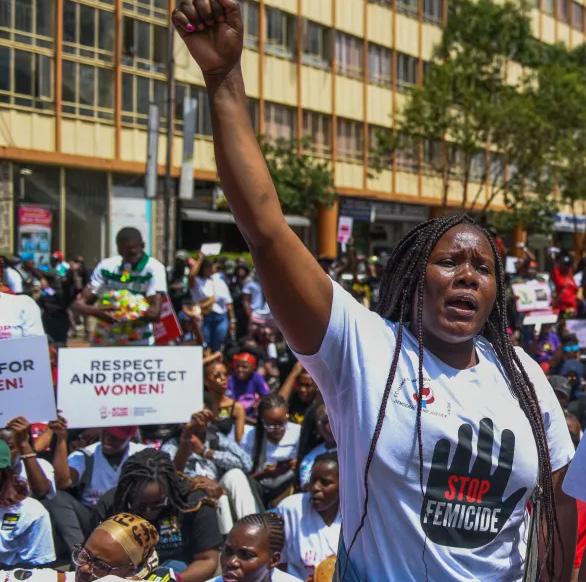

the same time, men justified their actions by saying that they could not restrain themselves or were angry because the woman, in their opinion, did something wrong.
Activists from organisations such as Feminists in Kenya, AkiliDada, FEMNET, the Gay and Lesbian Coalition of Kenya (GALCK), the National Gay and Lesbian Human Rights Commission (NGLHRC) and individual feminists soon started raising awareness. As the discussion on femicide intensified, thousands of Kenyans turned out on nationwide protests on January 27, 2024.
Well-known male activists like Boniface Mwangi urged more men to join the call to end the violent killings. In addition, journalist John Allan Namu highlighted the statistics to demystify the justification of femicide, indicating most women were killed in their homes. Furthermore, Church leaders like Archbishop Jackson Ole Sapit called for an investigation into the recent killings.
Many women leaders were not vocal about femicide, which angered Kenyans ‘ ’
Often, it is assumed that leaders can and should solve problems, act decisively and know what to do. This was not the case. The majority of the women leaders did not speak out against femicide, which angered Kenyans.
Some of the women who showed up came in for more criticism. For example, Nairobi Women Representative Esther Passaris was accused of trying to use the platform to gain political mileage. Nominated Member of Parliament Sabina Chege, on the other hand, called on women and girls to work hard and become financially independent to avoid being victims of femicide.
This was interpreted as victim blaming

and women called her out because it appeared she had not looked at the statistics, and that she was justifying femicide. In addition, this illustrated a lack of political will among women leaders.
The Kenyan government recently ordered Airbnb and short-term accommodation operators to register their properties with the Tourism Regulatory Authority (TRA). This is to guarantee that they meet strict standards of guest safety and security. Moreover, severe penalties will be imposed on operators and properties found not complying with the regulations.
Director of Criminal Investigations
Mohamed Amin assembled a specially trained team of investigators to speed up the examination of femicide cases. The team comprises criminal intelligence analysts and forensic experts tasked with coming up with swift and comprehensive preventive strategies to address sexual offences and the murder of women.
Amin also appealed to the public to volunteer information that could aid investigations or assist in the apprehension of perpetrators of the crimes through a tollfree hotline.
The fight against femicide is hamstrung by limitation in the data, uneven news coverage and underreporting in some regions. The ongoing efforts and challenges in combating it underscore the urgency of addressing this silent epidemic.
Kenya must continue to dismantle the barriers that perpetuate femicide. A collective commitment to legal reforms, education and support systems, coupled with international collaboration, can pave the way for a safer and more equitable future. As we reflect on the magnitude of the problem, let us remember that our voices and actions today matter and define tomorrow. It is time to break the silence and stand united against femicide in Kenya. There is no justification for murder.
To mark International Women’s Day this March, a webinar brought together women and girls in all their diversity and multiple identities, civil society, government, women's rights organisations, feminists and men promoting the rights of women – all adding their voices to the increasing call to end femicide in Africa
AFRICAN women and their male supporters are raising the tempo on the controversial issue of femicide on the continent. Africans Rising, a robust pan-African body, made sure that their voices are now heard loud and clear even though it is a tough task.
According to Africans Rising Engagement and Collaboration Regional Organiser, Ann Osamba, there are some loopholes and grey areas that continue to impede anti-femicide organising in Africa. Despite the numerous legal frameworks both at national and regional levels, African women and girls in all their diversity continued to experience the impact of femicide, she said.
Shyleen Momanyi from the Young Women Leadership Institute in Kenya pointed out that there had been an increase in reporting on femicide cases because of the outcry that was coming from feminist activism. “The data has been missing around femicide cases since they've been collectively put together as homicide,” she said.
But now, it is no long just homicide but of “women getting killed because of extreme discrimination”. She said she was amazed to see “people coming out in radical ways and unapologetically to speak against femicide and even challenging people on the online spaces who are very misogynistic, hateful and focused on victim blaming”.
Momanyi highlighted the struggle of organising with limited funding, urging women to be “radical in resourcing for movements” and for these movements to “utilise platforms of influence, have a support system for the victims, safety and security for activists who are highly targeted”.
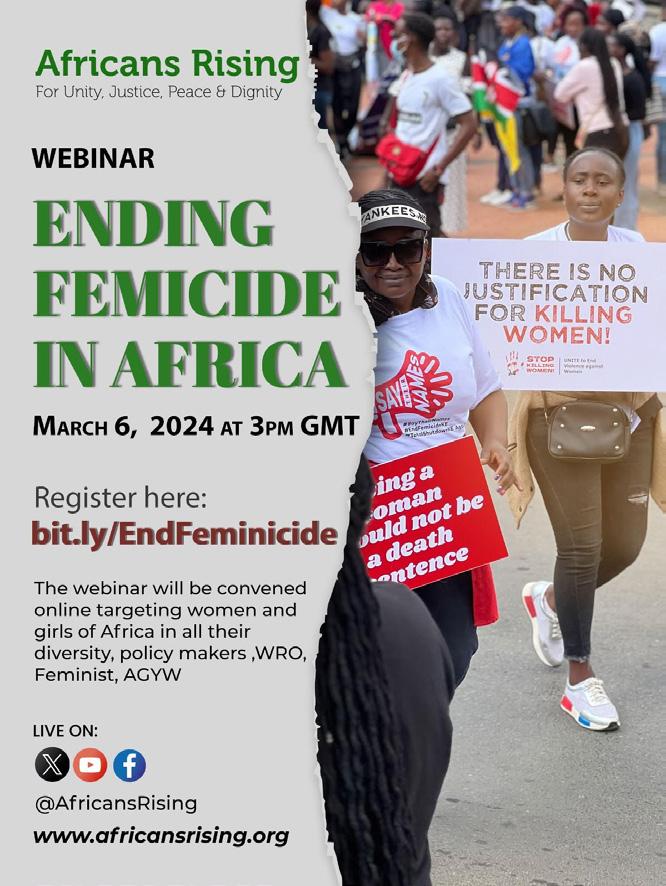
Matilda Phooko from the Women’s Rights Department at the Centre for Human Rights, University of Pretoria took a critical look at statistics from the police on femicide. The report by South Africa Police Crime Statistics for the third quarter of 2023/24 showed 881 murders of women aged between 18 years and above.
Phooko was concerned about the way the data captured the number of women and excluded girls. She added that refusal to recognise gender-based violence was in itself gender discrimination. She acknowledged that despite the existence of the Maputo Protocol on the Rights of Women in Africa, “there are no legal provisions for femicide”.
“This has slowed down government response in South Africa when it comes to femicide. The data that is captured by the government compromises the quality of the interventions considering it does not acknowledge young girls in all the diversity, including intersectionality,” Phooko argued.
In Lesotho, it was not until 1992, when the Land Act was amended, that women were allowed to legally inherit property belonging to their husbands, noted Mpho Maema Motsamai. Before then, she said that femicide in the country was a big issue when women were being abused and killed by family members over property rights.
In 2006 women were finally given a say in their marriage and were consulted on important issues. In 2010 the Land Act was strengthened, equating women with their male counterparts and enabled them to own land just like men.
Many participants at the webinar said it was an eye-opener that highlighted the still weak legal framework for tackling femicide work in Africa. They spoke of the need to strengthen reporting and improving data collection, and the need to connect the struggles on women's rights to build a solid movement to end rampant femicide.
The following recommendations were drawn up:
• Radical resource mobilisation for movements to support them in addressing women’s needs
• Creation of spaces to help discuss issues and concerns on femicide
• Harmonisation and integration of data on femicide.
• Interventions to tackle femicide broadly and acknowledge the stages girls go through to become women
• Socialisation and instilling of norms
• Implementation of effective laws and policies to protect women
• Hotline services to be provided to enable women to report cases of gender-based violence

While the country is widely regarded as a model of democracy, it is facing a growing social problem targeting mainly women, writes GorataChepete
SINCE Botswana gained independence in 1966, it has been referred to as a shining example of democracy. The nation has upheld human rights principles and worked tirelessly to protect the civil liberties of its citizens.
With a stable political environment and effective management of natural resources, Botswana has seen impressive economic growth. Plus, its proactive stance against corruption has earned it accolades for accountability and transparency.
This is all thanks to the country’s commitment to national unity and shared values. But amidst the celebrations, there's a darker reality. Botswana is grappling with alarmingly high rates of gender-based violence (GBV) against women and girls.
Various forms of GBV, including domestic violence, sexual assault and harmful traditional practices, continue to affect individuals and communities across the country. Factors such as unequal power dynamics, socio-economic disparities, cultural norms, and inadequate access to support services contribute to the prevalence of GBV.
Shockingly, studies have revealed that over two-thirds of women in Botswana have experienced abuse, a staggering figure that far exceeds the global average, and the situation seems to worsen with each passing year. This isn't just a problem; it's a complex challenge that has been festering for decades.
Despite efforts, it remains an issue that defies easy solutions. It's what experts call a "wicked problem," one that has eluded effective resolution for far too long.
The issue of domestic violence is deeply intertwined with sociocultural norms that perpetuate male dominance, leaving women vulnerable and marginalised. This cultural backdrop glorifies male superiority while relegating women to subordinate roles, fostering an environment where violence against women is alarmingly common. As a result, tensions between men and women escalate, leaving women feeling insecure and unprotected.
The repercussions of this cultural framework extend far beyond individual
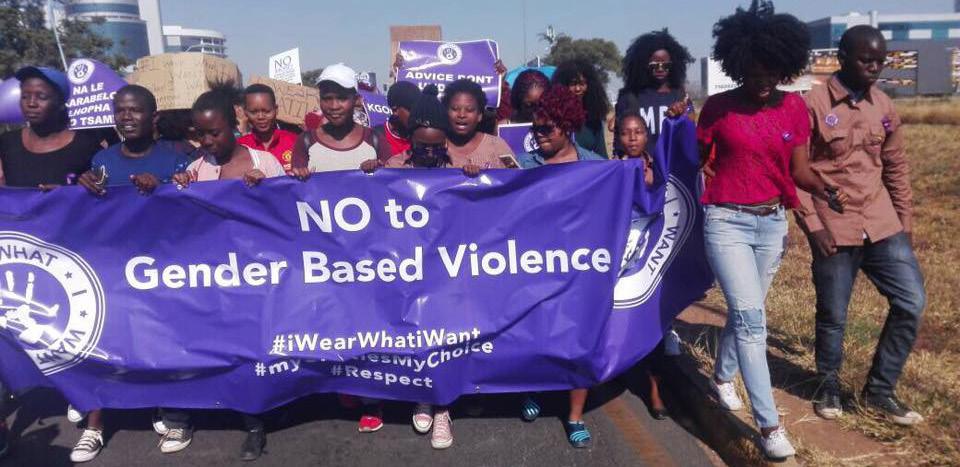
relationships, permeating various aspects of society and perpetuating systemic inequalities. Women, in their vulnerability, face significant barriers to seeking help or escaping abusive situations due to societal stigma, economic dependence and limited access to resources.
Moreover, the normalisation of violence against women in general contributes to a broader culture of impunity, where perpetrators often go unpunished, further reinforcing the cycle of abuse and perpetuating feelings of insecurity among women. Addressing domestic violence necessitates not only challenging these entrenched socio-cultural norms but also implementing comprehensive strategies that prioritise prevention, support for survivors, and accountability for perpetrators at all levels of society.
Batswana have been mounting criticism against leaders at all levels for their failure to effectively address this pressing issue. It is indeed time to break the cycle of violence and create a society where everyone feels safe and respected.
In response, the Botswana government has attempted to take steps to combat GBV. These include enacting laws such as the Domestic Violence Act, 2008 and establishing support services such as shelters and counselling centres.
Additionally, the government has engaged in efforts to raise awareness, promote gender equality, and provide
education on human rights and respectful relationships. However, these strategies have proven to be futile.
To effectively address GBV in Botswana, a multi-faceted approach is essential. Firstly, there needs to be comprehensive legal reform to strengthen laws against such violence, including harsher penalties for perpetrators and improved access to justice for survivors.
Secondly, education and awareness programmes should be implemented to challenge harmful gender norms and promote gender equality from an early age, targeting both formal education and community outreach initiatives. Additionally, robust support services, including shelters and counselling, must be established to provide immediate assistance and long-term support for survivors.
Furthermore, partnerships between government agencies, civil society organisations and community leaders are crucial to coordinate efforts, share resources and foster a culture of zero tolerance towards GBV. Ultimately, sustained commitment from all sectors of society is needed to create a safer and more equitable environment for all Batswana.
Botswana may shine as a beacon of democracy, but it's also a stark reminder of the work that still needs to be done to ensure the safety and security of all its citizens, especially its women and girls.

Thirty years after the genocide in Rwanda, Ivan Muvunyi underlines the importance of Kinyarwanda in sustaining cohesiveness and unity in the country, although divisive theories fail to acknowledge the fact that all Rwandans speak the same language
IWENT to a boarding school in Rwanda in my early years of secondary education. Using Kinyarwanda, instead of English or French, to talk to other students was not allowed. This was just a symptom of a very complex historically-rooted phenomenon that has had a negative impact on Rwandan society and its development.
What is exceptional to Rwanda is that Kinyarwanda is its only native language. It is a critical binding force. Even the Rwandan National Anthem acknowledges this: our common culture identifies us. Our single language unifies us.
In April, Rwanda will commemorate the 30th anniversary of the genocide against the Tutsi. It was the horrific end product of divisiveness initiated by colonialists and promoted by the post-independence governments. In the aftermath of the genocide, one of the jailed perpetrators reflected that, actually, both victims and perpetrators shared the same language as he wrote what would become the new anthem.
This underlines the importance of Kinyarwanda in sustaining cohesiveness and unity among Rwandans. Divisive theories always avoid the fact of how all Rwandans speak the same language.
The dominance of European languages over native ones is not a challenge unique to Rwanda; rather, it is, to varying degrees, also faced by many developing countries that were colonised. The persistence of this seemingly easy-to-solve problem over
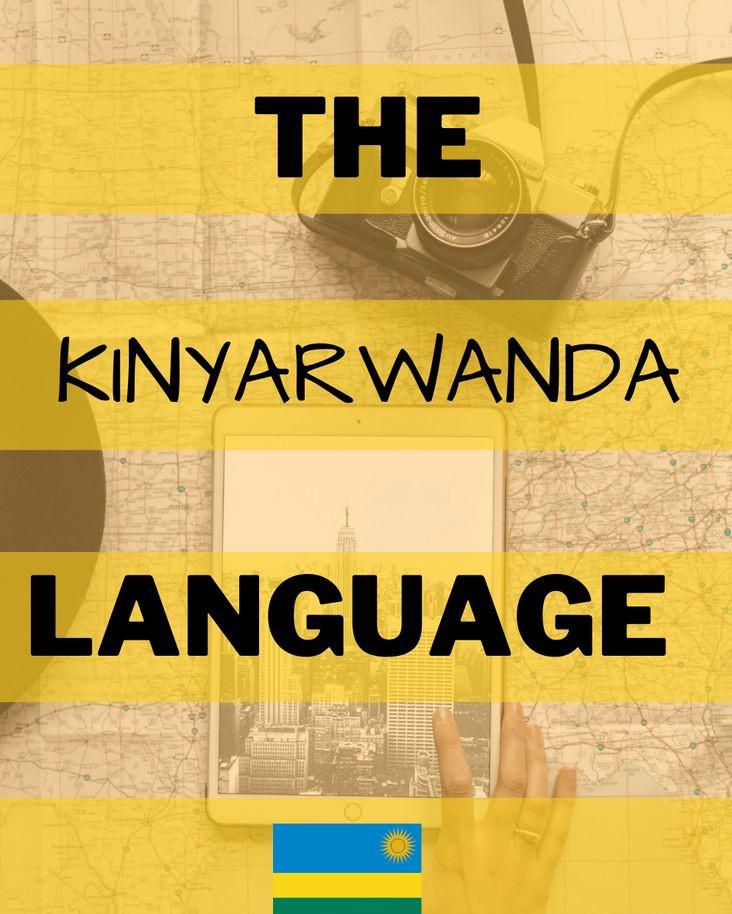

generations should be of great concern.
The implications are highlighted in the UN Human Development Report of 1996, which pointed out different development failures, including “rootless development”, whereby
cultural identity is undermined. Needless to say, anything that is rootless is very likely to fall.
Also connected to colonialism, the mass migrations due to violence against the Tutsis from 1959 to 1994 estranged a great number of Rwandans from their language, culture and identity. This further complicated the situation. Today, in many households, foreign languages
and mispronunciations manifest themselves in daily interactions.
So, discouraging the use of Kinyarwanda is like trying to remove that critical foundation of a building. At best you will have a wobbly structure; at worst, everything will collapse.
But the intent is usually to produce a “modern” society that is competitive in today’s globalised economies. In fact, at my former school, we were told they were nurturing future leaders. Would future leaders be less capable if they knew and embraced their language?
The best explanation I can get is from Frantz Fanon, one of the most influential anti-colonial thinkers and pan-Africanists. He said that it was an inferiority complex that led to such tendencies of erasing cultural originality among the formerly colonised nations, thus hindering their development.
Among the worst affected sectors that I can think of are the creative industries, which have been deprived of original knowledge. Over generations, knowledge, values, ideas and beliefs are becoming encrypted in what is evolving into a foreign native language.
We may all agree that Kinyarwanda is slowly slipping away from Rwandans, but “modernists” may question if holding on to our language may counter development prospects in the globalised world. This
Similar to computers, a society cannot function without a language ‘ ’
could not be further from the truth since globalisation is only beneficial to those who are prepared for it. This involves creating high value through originality.
Many industries, most notably the creative, literary and tourism fields, will remain in the
shadows if they lack a solid foundation. Moreover, African countries would benefit from greater cooperation beyond the boundaries of the Anglophone, Francophone and Lusophone camps.
Inter-generational communication is also deteriorating. An older family friend once told me how he even doubted his relevance in the community, given that everything is produced in a language he does not understand. Billboards, TV ads, government websites and product labels are rarely in Kinyarwanda.
Thomas Sankara was not exaggerating in his comparison of different forms of dominance whereby he concluded that cultural dominance was the most effective while also very flexible and relatively inexpensive.
A language is a collection of ideas, memories, values and beliefs, and it is, at the same time, a vehicle for those across generations. Similar to computers, a society cannot function without a language. Kinyarwanda is, therefore, an essential tool for setting our vision, developing solutions to national challenges and strengthening
our unity.
Thus, I would suggest that policymakers, for instance, can hold responsible anyone who suppresses others’ use of Kinyarwanda. Such individuals and institutions effectively violate the right to expression and also undermine the sovereignty of the country.
Language faculties in universities could spearhead research that aims at enriching Kinyarwanda and improving its access. School libraries are flooded with English and French dictionaries, but there is no single Kinyarwanda dictionary, for example. This is one of the basic endeavours that can have a significant impact.
Regulatory boards should require inclusive communication. For example, just as food products are required to indicate nutritional information, or how road signs are supposed to be of a certain height, they should also be required to provide a Kinyarwanda translation.
I do not want this to be misinterpreted as advocacy against other languages. Indeed, foreign languages offer loads of opportunities. But as the Kenyan novelist, Ngũgĩ wa Thiong’o, brilliantly insists: “If you know all the languages of the world, and you don’t know your mother tongue, that is enslavement. But if you know your mother tongue and add to it all the languages of the world, that is empowerment.”
